2018 Volkswagen Atlas V6 SE: What's It Like to Live With?
Read about the most recent updates of the 2018 Volkswagen Atlas in our long term road test on Edmunds
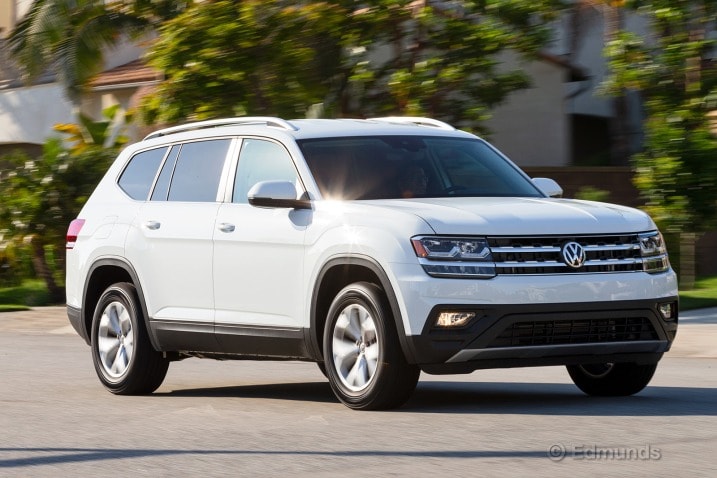
What do you want to know about?
- Introduction
- Monthly Update for July 2018
- Monthly Update for August 2018
- Monthly Update for September 2018
- Monthly Update for October 2018
- Monthly Update for November 2018
- Monthly Update for December 2018
- Monthly Update for January 2019
- Monthly Update for February 2019
- Monthly Update for March 2019
- Monthly Update for April 2019
- Monthly Update for May 2019
- Monthly Update for June 2019
- Wrap-Up
Introduction
What Did We Buy?
While consumers buy SUVs as fast as manufacturers can make them, some models are more desirable than others. The Touareg and the Tiguan — Volkswagen's most recent attempts at making SUVs for Americans — did not catch on like the German automaker's more charismatic Jetta and Golf compacts. But Volkswagen's third attempt, the full-size 2018 Volkswagen Atlas, may have all the pieces to change that.
Sized like the Ford Explorer, Honda Pilot and Toyota Highlander, the Atlas features a roomy three-row interior and fuel-efficient engine options that make it ideal for American buyers. Our initial impressions suggest that the Atlas isn't as charismatic as the more rough-and-tumble Touareg, but it's roomier inside, it has better infotainment technology, and its large third row makes it appeal to a broader spectrum of SUV buyers.
What Options Does It Have?
VW's highly tiered trim structure means that additional features and option packages are just part of the trim level, so we ordered a well-equipped 2018 Volkswagen Atlas V6 SE 4Motion with Technology package. In the tiered spectrum, only the SEL offers more content.

The 3.6-liter V6 engine produces 276 horsepower and 266 pound-feet of torque using regular gasoline and mates to a traditional eight-speed transmission. For drivers who frequently operate the Atlas at or near its maximum payload capacity of 1,213 pounds, the standard inline four-cylinder (235 hp, 258 lb-ft) will prove too sluggish to accelerate that kind of mass. As it is, the V6 is only average at accelerating the Atlas' heft (ranging from 4,222 to 4,502 pounds) up to highway speed.
In standard configuration, the Atlas is front-wheel-drive, but our long-termer benefits from Volkswagen's 4Motion all-wheel-drive system. This clutch-based system engages the rear wheels as needed, such as on light-duty off-road trails or when slippery road conditions require more traction. An adjustable drive mode dial also allows drivers to select specific profiles that optimize transmission shifting and stability control settings for snow, off-road or highway driving.
Standard features for the SE trim include keyless entry, push-button start, an infotainment system with an 8-inch display, additional USB ports, heated front seats, rear sunshades, rain-sensing wipers, automatic headlights, blind-spot monitoring with rear cross-traffic alert, and a rearview camera.
VW's Car-Net is also standard and allows owners to find their car, set speed, set geofencing and curfew boundaries for younger drivers, and check vehicle health and door lock status from a computer or smartphone app.
The Technology package adds three-zone climate control, a power liftgate, adaptive cruise control, front park assist, lane keeping assist, and remote start to the SE trim.

Finally, we could have opted for second-row captain's chairs, making our Atlas a six-seater, but our test model features a traditional 60/40-split folding bench seat. With seven seats, this was the practical choice for our staff and our families and friends.
Why We Got It
Is the third time the charm? That's what we aim to find out with VW's new Atlas. While its size, tech and capability seem just right for American buyers, will they avert their gazes away from the Explorer, the Highlander and the Pilot for a new vehicle without a track record?
Over the next year of driving, we hope to exercise all of the Atlas' attributes by subjecting it to stop-and-go traffic, highway cruising, cargo hauling, and even some light off-roading. Then we'll see if the new SUV's suspension, all-wheel-drive system, efficiency, and overall comfort meet or beat the standards set by the rest of the full-size SUV class.
Follow our progress during our long-term road test for our latest thoughts on this 2018 Volkswagen Atlas.
The manufacturer provided this vehicle for the purpose of evaluation.
Monthly Update for July 2018
Where Did We Drive It?
We did an admirable job putting our 2018 Volkswagen Atlas to work in its first full month of long-term testing. We started July with 820 miles on the odometer and ended with 3,468. Dan Edmunds and I added the bulk of those miles. I drove the Atlas to Lake Tahoe, California, in the middle of the month, and then Dan drove the Atlas to Oregon at the end of the month.
You'll read Dan's commentary in the Atlas' August update. What follows are my first thoughts on our new Atlas. Short version: It's really good.

What Kind of Fuel Economy Did It Get?
Frequent freeway driving boosted the Atlas' fuel economy a bit. In July, we averaged 19.7 mpg, slightly above the EPA estimate of 19 mpg combined (17 city/23 highway). Most of the fill-ups for my drive to Lake Tahoe returned mpg in the low 20s. But Dan got the best fuel efficiency for the month, with a tank that returned 24.9 mpg.
Average lifetime mpg: 19.7
EPA mpg rating: 19 combined (17 city/23 highway)
Best fill mpg: 24.9
Best range: 336 miles
Current odometer: 3,468 miles
Maintenance and Upkeep
Since our test began, we've received a few notices about possible Atlas recalls. Only one is applicable to our test vehicle. It states: "If a child restraint with a larger than recommended base is installed in the center position of the second-row bench seat, it may damage both the center and adjacent outboard safety belt buckles. A damaged safety belt buckle can release unexpectedly, increasing the risk of injury in a crash."
We'll likely address this at our first scheduled service. Otherwise, everything is working as it should.
Logbook Highlights
Performance
"The Atlas' V6 makes a sporty snarl when you mash the gas, especially once you get it revving close to redline. But I wouldn't mind having a bit more oomph to go along with the sound. Acceleration, while adequate, doesn't seem to be as quick as what you get from some other three-row crossovers." — Brent Romans, senior editor

Comfort
"Our Atlas is impressively comfortable for long-distance driving. I like the way VW tuned the suspension. It absorbs bumps with ease and does so without being soft or wallowy. I'm also comfortable in the driver's seat. I've done a few five-hour stints in the Atlas and felt just fine. Using the Atlas for an all-day drive should be easy." — Brent Romans
"Our SE test car has the 18-inch wheels. The more expensive SEL trim level has larger 20-inch wheels, which look nicer than the 18s but likely add a bit of stiffness to the ride quality. It's probably not much, though. In our official Edmunds scoring for the Atlas, we used an SEL and gave it four stars out of five for ride quality." — Brent Romans
Interior
"I used our Atlas to transport seven people recently. I drove my family (wife, two kids), my in-laws and an adult cousin out to dinner. It was about a 30-minute drive each way. We put the kids in the third-row seat, and everyone else still had plenty of room. It's like a bus inside this thing." — Brent Romans

Technology-Audio
"Our Atlas has VW's latest infotainment system. It seems like a capable and likable system, but that's about all I can say about it. The thing is, I've barely used any of the VW-specific features. Most of the time, I have my phone connected via Apple CarPlay. From that standpoint, at least, the screen's 8-inch size and easy-to-reach location are boons for the smartphone integration experience." — Brent Romans
Cargo Space
"There's plenty of cargo room in this thing. It's like having your own warehouse. There is 20.6 cubic feet of space behind the third row, and a maximum of 96.8 cubic feet with the second and third rows folded." — Brent Romans
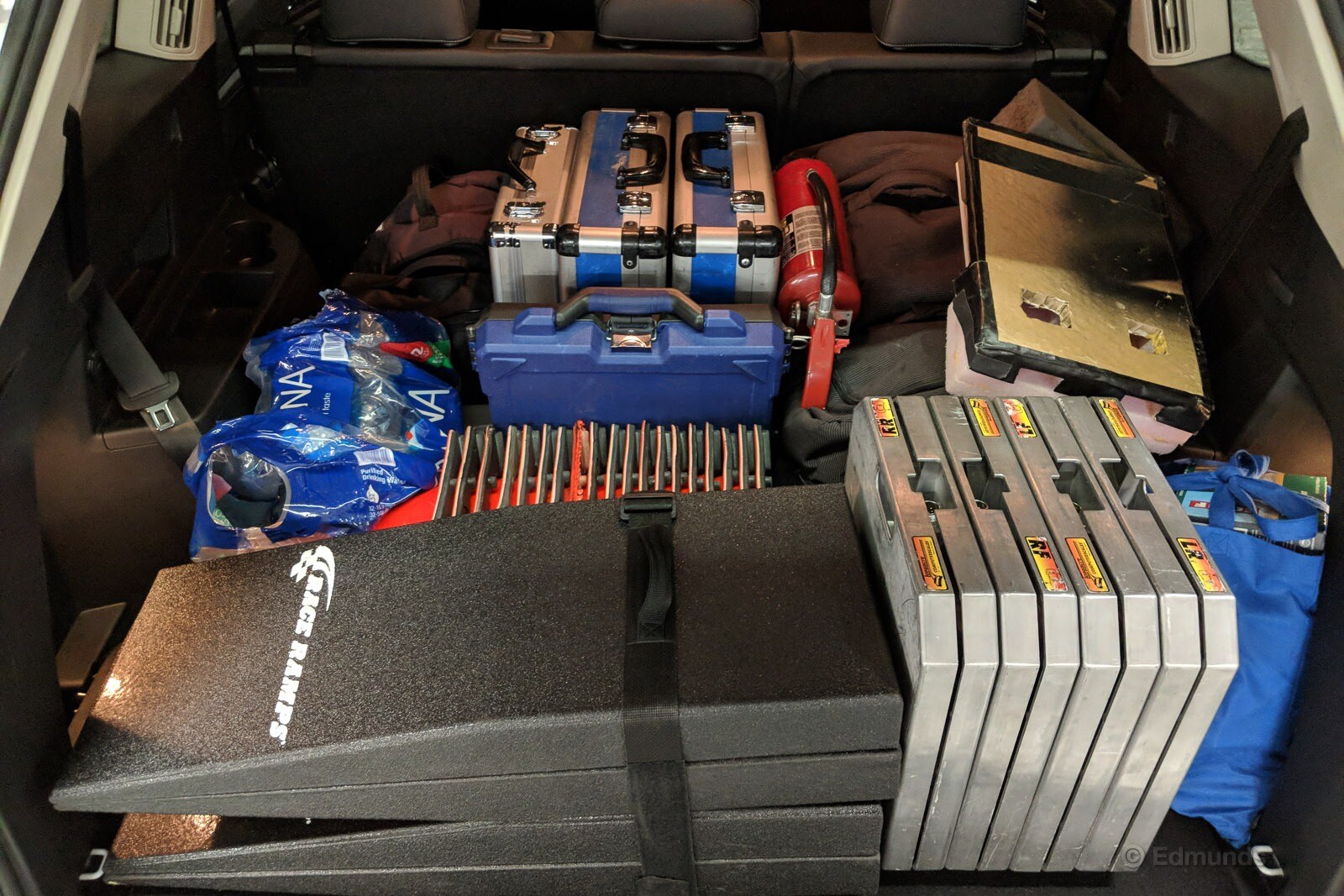
"Our Atlas' third-row seat is roomy enough for adults, but I can make the case that there's another reason to purchase a three-row SUV even if you don't need that third row: cargo capacity! I haul our testing equipment to our test track every week and it's a lot of stuff. The Atlas swallows up the gear with no fuss and no mess. Easy peasy." — Rex Tokeshi-Torres, vehicle testing technician
Miscellaneous
"Around town and on the highway, the Atlas feels respectably maneuverable. Drive it around in a tight parking lot, however, and its bulky size becomes more apparent. This VW is one of the biggest crossovers on the market, dimensionally. Thankfully, it's pretty easy to see out of." — Brent Romans
"The Atlas is aesthetically pleasing, with a unique, broad design that stands out among other full- and midsize SUVs." — Rex Tokeshi-Torres

Monthly Update for August 2018
Where Did We Drive It?
As Brent alluded to in July's update, our man Dan Edmunds drove our new long-term 2018 Volkswagen Atlas to Oregon at the end of July/beginning of August. In one week, Dan drove more than 2,000 miles, or roughly half of the Atlas' miles traveled up until that point. After his return, our team puttered around the Los Angeles area for the rest of the month. Overall, we added 1,683 miles to the odometer in August.
What Kind of Fuel Economy Did It Get?
In August, Dan's trip alone accounted for 1,024 of those 1,683 miles. He averaged 24.2 mpg on his way back down the Pacific coast, surpassing the EPA's highway rating of 23 mpg. Dan also set a record on a leg from Eureka, Oregon, to Madera, California , achieving a new best fill record of 25.9 mpg.
Setting a new record is admittedly easy when a car is new to our fleet, but exceeding the EPA rating by nearly 13 percent is pretty good. I don't see us beating this record, unless Dan makes a concerted effort to supplant his own achievement. He's set best fuel records for our three previous three-row SUVs: the 2014 Toyota Highlander (26.5 mpg), the 2016 Honda Pilot (28.8 mpg) and the 2016 Mazda CX-9 (26.7 mpg).
Average lifetime mpg: 19.5
EPA mpg rating: 19 combined (17 city/23 highway)
Best fill mpg: 25.9
Best range: 397.6 miles
Current odometer: 5,152 miles
Maintenance and Upkeep
None.
Logbook Highlights
Performance
"My family and I took the Atlas to Oregon to visit my parents, and I went into the drive with no expectations of our new three-row SUV. I couldn't have been more pleasantly surprised. Its steering turned out to be just about perfect, with impeccable straight-line stability on the long freeway stretches, smooth response, and nicely weighted effort buildup through the mountainous turns farther up the road. The chassis swallowed up the coastal Northwest's wavy pavement with no apparent effort, and the Atlas felt at home carving through any number of corners, whether they were billiard-table smooth or tortured by land movement. Where did this come from?" — Dan Edmunds, director of vehicle testing

Interior
"This feels big inside. The cabin is wide, but it doesn't feel like the front-seat passenger is far away. What there is instead is an abundance of elbow and hiproom. You aren't even close to being scrunched up against the door panel.
"As for the seats, they offer plenty of space and good support. I only wish the seat bottom was less flat and more conforming. It's not a perfect fit for my tall frame.
"At first I thought the dashboard styling was a bit dull, but my wife was a big fan. She liked the clean lines and simplicity. There's a lot to be said for that, but it still seems like the switchgear and buttons are dwarfed by the size and scale of the Atlas' cabin." — Dan Edmunds
Technology-Audio
"I firmly believe that adaptive cruise control helps save your sanity, especially on these dreadful stop-and-go L.A. commutes. The gargantuan Atlas benefits from this technology by maintaining a safe, conservative distance from the car in front no matter if you're going 25 mph or 70 mph." — Rex Tokeshi-Torres, vehicle testing technician
Cargo Space
"We went on a point-to-point hike with my brother and his adult kids while in Oregon, and the Atlas was the shuttle vehicle. Six adults and their day packs had no trouble fitting, and even those in the third row had zero complaints. There's decent space back there, and the second-row tilt feature makes it pretty easy to clamber in and out.
"On the way home, my family's luggage fit behind the second row easily. We had enough space that we kept one third-row seat up to prevent our stuff from sliding around. Pretty good utility here to go along with all of that passenger space in the first two rows." — Dan Edmunds
"You know those people who carry humongous 40-ounce water bottles? I'm one of those, and I'm always on the lookout for cupholders that can accommodate my oil drum-size bottles. Usually, I have to place my water bottle between the door and my thigh or on the passenger seat, so it is easily accessible. Thankfully, I can report that our Volkswagen Atlas can store my water bottle safely. Hydration is important — especially in the brutal heat of a Southern California summer." — Rex Tokeshi-Torres

MPG
"Our round trip amounted to 2,129 miles. The Altas averaged 23.7 mpg overall, which compares quite favorably to its fuel economy rating of 19 mpg combined (17 city/23 highway). The trip was a mix of highway cruising, some city driving and even a bit of light off-roading. All of that makes the fact that the average exceeded the highway rating impressive enough, but the trip's best tank of 25.9 mpg (over a best-range distance of 397.6 miles) pretty much destroyed the highway rating. If this trip is any indication, Atlas mpg ratings are pretty achievable." — Dan Edmunds

Monthly Update for September 2018
Where Did We Drive It?
The 2018 Volkswagen Atlas has been in our fleet for a few months now, which is typically when the new-car smell wears off and we start taking it to task for any flaw, egregious or slight. But judging from this month's logbook comments, we're still singing the Atlas' praises. Lackadaisical acceleration and dull cabin design aside, we haven't really found much to fault the Atlas for. Its all-round excellence is why we recently rated the 2018 Atlas four out of five stars overall.
The Atlas mostly stayed around Los Angeles this month, though Mike took the family on a camping trip to San Clemente one weekend. Read on to find how the city-heavy month affected overall fuel economy.
What Kind of Fuel Economy Did It Get?
Dan's Oregon trip in July and August temporarily boosted the Atlas' overall fuel economy, but September's full month of urban driving normalized the results. For the record, monthly fuel economy in July and August were 19.7 mpg and 19.0 mpg, respectively, while we posted a middling 16.0 mpg in September.
Overall fuel economy fell from 19.5 mpg to 18.7 mpg, which is still pretty close to the 19 mpg EPA combined estimate.
Average lifetime mpg: 18.7
EPA mpg rating: 19 combined (17 city/23 highway)
Best fill mpg: 25.9
Best range: 397.6 miles
Current odometer: 6,173 miles
Maintenance and Upkeep
Since our last update, NHTSA has issued two Atlas recalls. The first (campaign number 18V-536) affects an estimated 8,416 vehicles built between March 5, 2017, and June 12, 2018. The brake caliper bracket bolts might not have been torqued correctly, which can cause the bracket to loosen and the brake caliper to move on the steering knuckle.
The second (campaign number 18V-537) affects an estimated 9,685 vehicles built between November 17, 2016, and August 18, 2017. An HVAC drain tube may have been twisted during installation, causing water to drain into the cabin or onto the airbag control module. An airbag control module malfunction may cause the airbags to deploy unintentionally.
Buyers were expected to be notified by October 14, and dealer replacement parts were expected to be available that day. You can also check your VIN on NHTSA's website or Volkswagen's website to see if your Atlas is affected.
Logbook Highlights
Performance
"I drove the Atlas for the first time this weekend and came away very impressed. It is quiet, comfortable, and fairly easy to maneuver in parking lots of varying sizes. The front end feels wide initially due to its flat hood, but it's something you quickly get accustomed to." — Ron Montoya, senior consumer advice editor
Interior
"I am impressed by the Atlas as a kid-hauler.
"Access: The rear door opening is exceptionally wide, and the door itself swings open 90 degrees. It makes the door heavy for kids to open, especially in the tight quarters of parking lots. But I do appreciate how easy it is to maneuver my heavyweight front-facing toddler seat into the car.
"Installation: The LATCH anchors are easily accessed, as is the seatback-mounted top tether. A well-placed seat-folding lever beside the headrest means I don't have to climb into the cargo area to clip or tighten the upper tether either. I don't have to remove the headrests because they lift high enough to clear the top of the child seat.

"Seat pros: The seatbacks recline and the lower cushions slide fore and aft. The double-wide Atlas seat bottoms allow for the entire child seat base to fit, unlike some cars where they hang over into the next seat. This allows me to recline the seats to an optimal safe-yet-sleep-ready position. Maybe it's my own peeve, but when the sandman visits and the seats are too upright, kids get into that awkward chin-in-the-chest, head-bobbing routine. I can't stand seeing it.
"Seat cons: Going back to the sliding second-row seats — they don't slide very far. There is enough space that tikes headed for the third row can probably wriggle past. Anyone larger requires Cirque du Soleil levels of flexibility, involving scaling the second row, climbing through the cargo area or removing and reinstalling the child seats. At the very least, all options qualify as annoying.
"Still, the pros far outweigh the cons when it comes to the kid-friendly Atlas. It is shaping up to be one of my favorites in this segment." ‐ Mike Schmidt, senior manager, vehicle testing operations
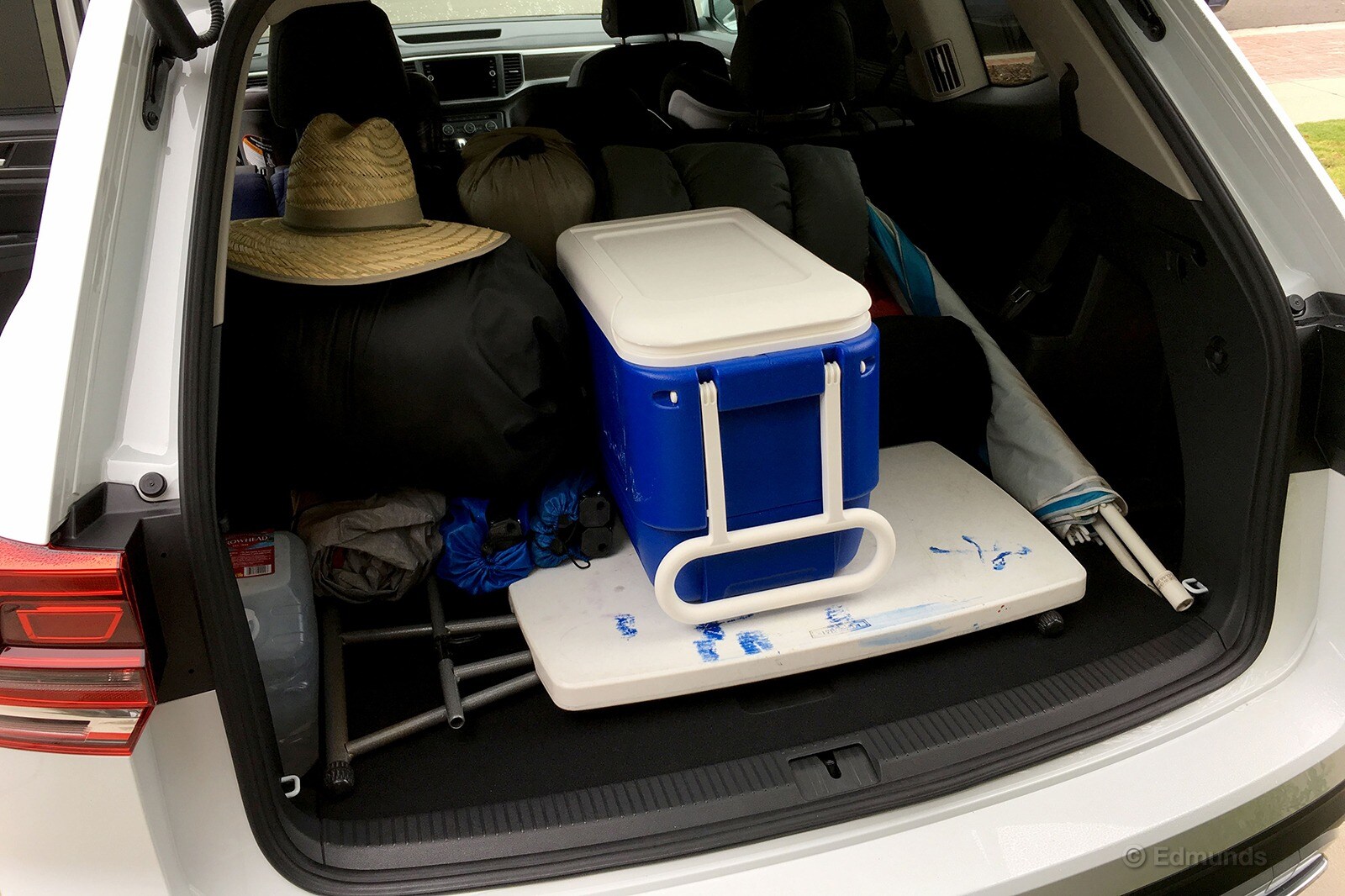
Cargo Space
"Last weekend we loaded the Atlas for a two-night beach camping trip. We packed light. Regardless, with the third row down we had space for a cooler, tent, chairs, sleeping bags and more. And there was room to spare. I'd consider it equally as good in the cargo department as the three-row Explorer we left parked in the garage." — Mike Schmidt
Miscellaneous
"My cousin told me he was considering the Honda Pilot and Volkswagen Atlas for his next vehicle purchase. He asked me what I thought was the better of the two SUVs. I told him they're both solid, but if he was going to buy I'd go with the Pilot for the better resale value and proven reliability. If he was going to lease it, I'd recommend the Atlas since it's a change of pace from the Hondas he's driven in the past." — Ron Montoya

Monthly Update for October 2018
Where Did We Drive It?
In October, we split our time in the 2018 Volkswagen Atlas between road trips and normal commuting. For most of the month, the Atlas safely shuttled our editors to and from work. While Kathleen found the Atlas mostly enjoyable, its anonymous character enraged Will. Despite Will's derision, Jonathan thought it would be an excellent road-trip companion, loading it up with friends, surfboards and gear for two straight weekends while they searched for the perfect wave.
What Kind of Fuel Economy Did It Get?
Jonathan added hundreds of highway miles to the Atlas' odometer, but the additional weight of his crew of six and their surfing equipment meant that he didn't set any new fuel economy records. The highway miles helped offset several weeks of city driving later in the month, but the Atlas still finished October with a 16.9 mpg monthly average.
That dropped the lifetime average from 18.7 mpg to 18.2 mpg, the third consecutive monthly slide since Dan Edmunds and Brent Romans kicked off the Atlas' arrival with long-distance road trips.
Average lifetime mpg: 18.2
EPA mpg rating: 19 combined (17 city/23 highway)
Best fill mpg: 25.9
Best range: 397.6 miles
Current odometer: 7,951 miles
Maintenance and Upkeep
None.
Logbook Highlights
Interior
"I can't believe how plasticky this interior is. No effort has been made with any touch point, other than the steering wheel and shifter, and even the shifter isn't very nice. The interior contributes a lot to a feeling I have that Volkswagen has totally lost its identity in America. Nothing of what used to make their cars special is evident in vehicles such as the new Jetta, Tiguan or this Atlas. It's an utterly generic vehicle (except for the engine, which I'll address separately), even if it is eminently practical. It's like a Costco-brand car: Large Volume People Mover, available in aisle 6." — Will Kaufman, content strategist and news editor

"Every time I grab the Atlas for an out-of-town weekend activity, I'm always grateful for its ultra cavernous cargo area, especially when all the seats are folded forward. All other midsize three-row SUVs can't hold a candle to it. Though the Honda Pilot may be slightly more well-rounded, the space in the Atlas alone could sway me." — Jonathan Elfalan, manager, vehicle testing
Performance
"I like this engine, but why is it in the Atlas? The naturally aspirated VR6 is the one distinctly Volkswagen element in the Atlas, and the only part of the Atlas with any personality. It's responsive and revs pretty freely, returning a nice, natural power curve. But it's lost in the big SUV's engine bay, weighed down and made sluggish by an excess of steel to cart around. There's a reason turbocharged motors are the default for the current generation of big SUVs, and it's not just for fuel economy, it's also the immediate, low-end torque. I'm glad VW is still making the VR6, but driving it in the Atlas just makes me wish they still put it in the Golf R." — Will Kaufman
"This thing is large and in charge, yet surprisingly easy to drive. From the start, I felt really comfortable behind the wheel and didn't feel the Atlas' size was a hindrance in traffic." — Kathleen Clonts, copy chief
Technology
"I really like that you can tune the radio to a different station and see what's playing before you press the knob to change it." — Kathleen Clonts

"The lane keeping assist feature kicked in on a freeway on-ramp and it startled me. I don't always drive the latest and greatest cars in our fleet, so I'm not yet used to this relatively new kind of driving aid. I corrected my line quickly, intent on never wanting to feel the computer pulling on the wheel again." — Kathleen Clonts
Miscellaneous
"Look, I 'get' the Atlas. The packaging is great and the interior is a positively massive space. You can carry adults comfortably in the third row and still have decent cargo area left over. It's relatively comfortable and rides well. But Lordy, the only thing in this vehicle with character is the VR6 and that's a problem because it's the wrong engine for a big SUV. Otherwise, the Atlas is painfully generic. Literally everything else in the segment has some sort of personality, whether that's great (Mazda CX-9) or not great (Chevy Traverse). The Atlas is just ... there. It's the automotive version of stain-proof chinos." — Will Kaufman

Monthly Update for November 2018
Where Did We Drive It?
After October's surfing road trips, our 2018 Volkswagen Atlas resumed a normal month of commuting duties in November. Few of our editors took our big SUV outside of greater L.A., but there were plenty of day trips. Josh drove to Ventura for a quick round of golf, while I transported my family between relatives' homes on Thanksgiving.

What Kind of Fuel Economy Did It Get?
The Atlas racked up about 1,270 miles in November and used 75 gallons of 87 octane fuel, for a monthly average of 16.8 mpg. The Volkswagen's overall fuel economy has been trending down since we broke it in with an Oregon road trip shortly after we received it in July.
I've been trying to figure out why the Atlas is underperforming relative to its estimates, and I think I know what's going on. Simply put, the massive cabin is perfect for shuttling duties, and that's exactly what we've been doing. But three-row crossovers are also great for road trips, and outside of Dan Edmunds' trip to Oregon, we haven't really allowed the Atlas to stretch its legs.
We had a Land Rover Discovery in the fleet until recently, and I surmise that our editors gravitated toward its more luxurious cabin for long hauls. Now that the Discovery has gone back to Land Rover, I think we'll naturally start showing the Atlas some love. Expect to see the overall average rise going forward.
Average lifetime mpg: 18
EPA mpg rating: 19 combined (17 city/23 highway)
Best fill mpg: 25.9
Best range: 397.6 miles
Current odometer: 9,224 miles
Maintenance and Upkeep
None.
Logbook Highlights
Performance
"I don't think of the 3.6-liter V6 engine as one of the Atlas' strengths. Sure, it's part of the 'narrow-angle' lineage, which means it's descended from the racy VR6 that used to spice up models such as the Corrado sport coupe. But let's be real. There's nothing racy about this one. It moves out well enough once you hit 4,000 rpm. But below that, it lacks oomph, and above that, it starts to lose a touch of composure. If I didn't already know its granddaddy was the VR6, I never would have guessed. Drive the Atlas V6 back to back with the V6-powered Honda Pilot, and I bet you'll rank the Honda engine No. 1." — Josh Sadlier, senior manager, content strategy
"One thing the Atlas will never be praised for is feeling small and nimble. Yeah, I know, these big three-row crossovers are, well, big. But I find the Atlas particularly bus-like from behind the wheel. Some larger vehicles have the desirable trait of seeming to shrink a size or two at speed. Sorry, Atlas. Not you." — Josh Sadlier
Technology
"The Atlas has one of the finest tech interfaces in the industry. It's easy to navigate and quick to respond to user inputs. Like the Atlas itself, the menus aren't extraordinarily attractive, but they are highly functional. Most of the virtual buttons disappear as you move your hand away from the touchscreen, reducing visual clutter when you aren't actively using it. And as Kathleen pointed out last month, the ability to preview songs before actually selecting a radio station is exceptionally helpful. Just turn the dial until you find a song you like, then click the dial to enter. It's such a simple idea, and yet only a handful of user interfaces offer such a feature." — Cameron Rogers, reviews editor
Utility
"I wheeled the Atlas from L.A. to Ventura County for a golf weekend with two friends, and it was the perfect tool for the job. With the third row folded flat, it was like having a truck bed back there. We could throw our golf bags in lengthwise, add a couple of pull carts and various other items, and not even fill up the cargo bay halfway. These three-row behemoths are often judged on the third row itself, but the massive cargo space when that row isn't in use can be just as handy." — Josh Sadlier
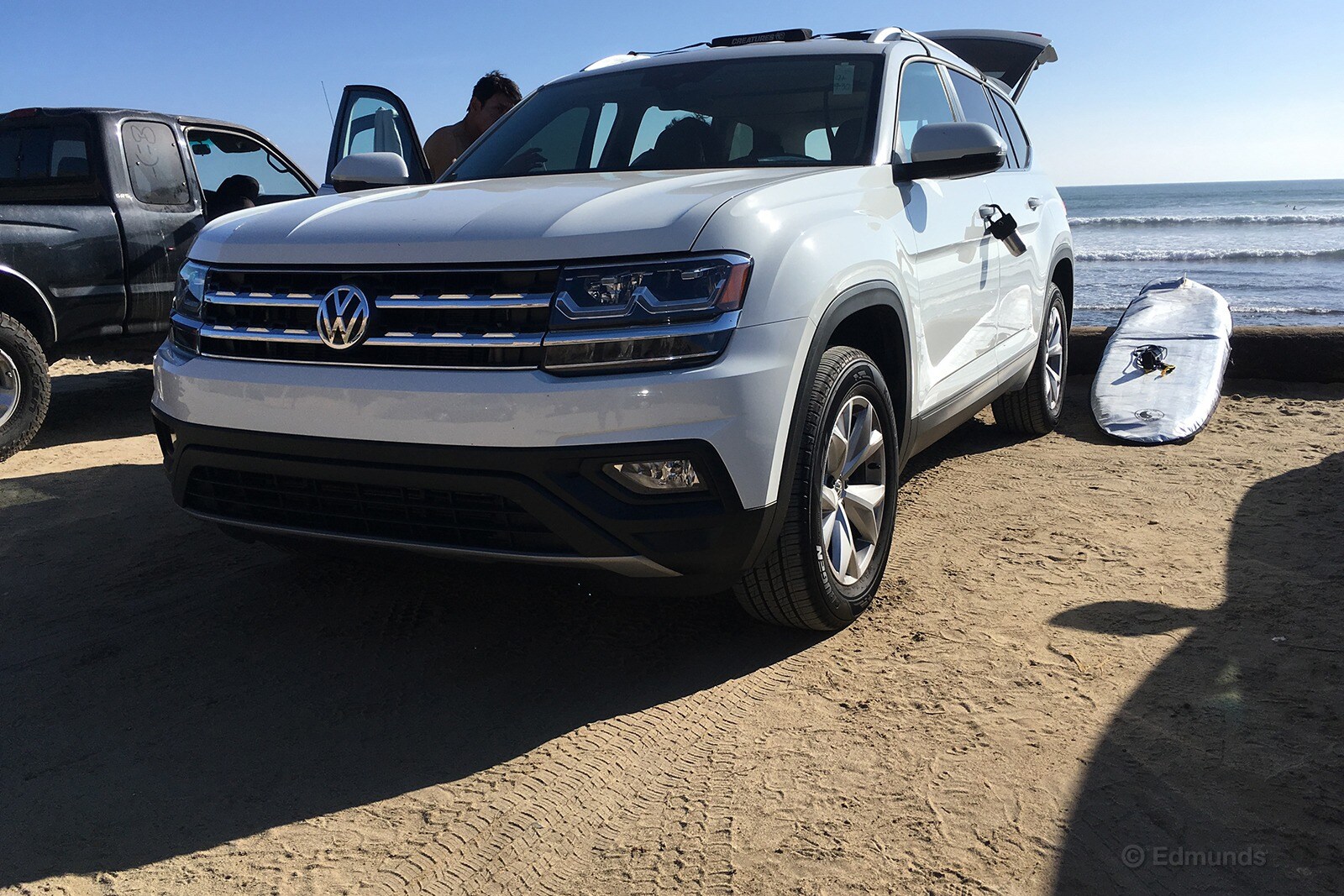
Monthly Update for December 2018
Where Did We Drive It?
For the past few months, we've used our long-term 2018 Volkswagen Atlas as a commuter car, shuffling between work, home and various school functions. In other words, we've driven the Atlas in conditions it would face 99 percent of the time in the real world. But we haven't taken it on a proper, multi-day road trip since Dan Edmunds drove it to Oregon shortly after we got it last July.
Our city-intensive driving patterns have sunk the Atlas' overall fuel economy compared against its EPA estimates. That changed in December. An Edmunds colleague outside of our department took his family to Big Bear, a ski town in our local mountains, over the holiday break and gave us much-needed road trip data while increasing the Atlas' overall fuel economy.
What Kind of Fuel Economy Did It Get?
We drove the Atlas 2,200 miles in December, far more than any other month since July. Monthly fuel economy was impressive. At 19.1 mpg, it encompassed a healthy mix of city and high-speed driving. All the highway driving boosted the Atlas' overall fuel economy from 18 mpg to 18.7, just a few ticks short of its 19 mpg combined rating.
Another road trip or two, and the Atlas will be right on target. We'll have to stretch its legs a little bit anyway, as the Atlas is falling slightly short of the 1,800 miles we try to pack onto our long-term cars each month.
Average lifetime mpg: 18.7
EPA mpg rating: 19 combined (17 city/23 highway)
Best fill mpg: 25.9
Best range: 397.6 miles
Current odometer: 11,427 miles
Maintenance and Upkeep
According to the NHTSA, certain 2018-2019 Volkswagen Atlas and 2019 Volkswagen Jetta models are being recalled because the car may not warn drivers when the key is left in the ignition and the door is opened. The recall is set to begin on January 18, 2019. More information is available here (campaign number 18V824000). Our Atlas is unaffected because it has keyless ignition.
"This morning I dropped the Atlas off at Santa Monica Volkswagen for its 10,000-mile service. I didn't have an appointment. Still, I figured I'd be OK by arriving at 7 a.m. when the service center opened.
"My adviser reassured me that was the case, giving an estimated completion time of noon. But I heard nothing back from him by the time noon rolled around. At 2 p.m., I called and left a voicemail. He finally returned my call at 3:30, with no acknowledgment of the disparity between the expectation he set more than eight hours earlier and reality. It was certainly frustrating. It was also ironic since he started a conversation at drop-off about how inconsiderate some customers can be toward him. Regardless, the car was ready for pickup.
"Service included replacing the oil and oil filter, topping off various fluids, rotating the tires, and three warranty recall campaigns:
"WV03 — check the brake caliper bolts (which were OK)
46H6 — check the seat belt buckles and add owner's manual supplement
23X1 — ECM update and battery charge
"Total cost for the service was $97.44." — Mike Schmidt, senior manager, vehicle testing operations

Logbook Highlights
Performance
"Our editors seem split on whether the V6 is adequate for such a large and heavy SUV. Josh, Will and Brent have noted the Atlas' lack of low-end response, but I disagree. True, the Atlas won't win in a stoplight race against some of its rivals — the Pilot and the CX-9 are quicker — but I think acceleration feels perfectly natural around town.
"And I don't mean in stop-and-go L.A. traffic either. Pushing from zero to a cruising speed of 45 mph is smooth, effortless and, according to my butt-dyno, pretty quick. I don't know why these guys are flooring it all over town and complaining when the Atlas doesn't ram the car ahead quickly enough, but the V6 feels good to me." — Cameron Rogers, reviews editor
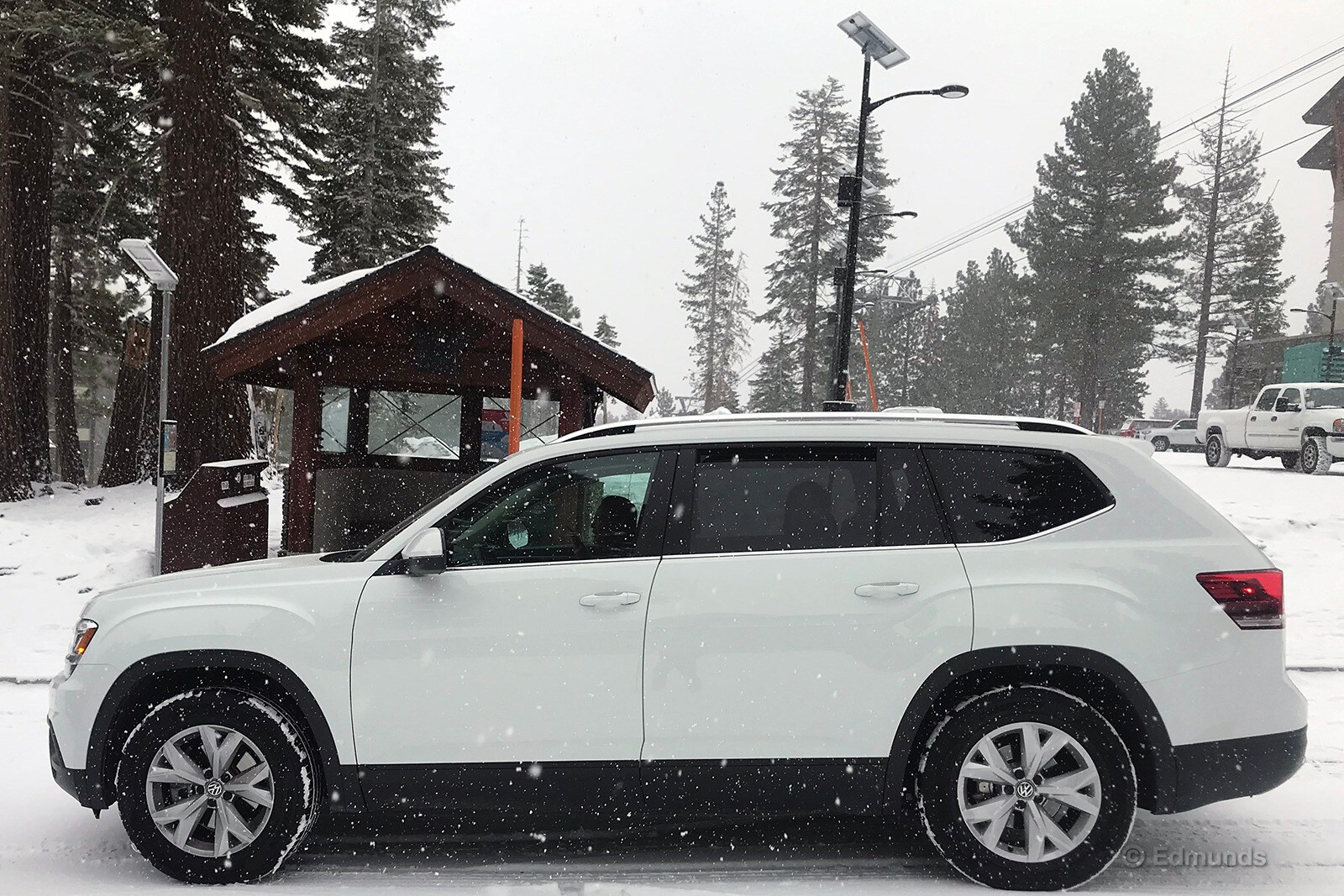
Interior
"Not all cars are perfect, and for me, the Atlas' weak spot is its interior design. The dashboard is drab and plain. Some would call it 'understated' or 'minimalist,' but I think it's downright ugly. There's a ton of plastic everywhere, and none of it looks or feels substantial or expensive. It's not anything that would prevent me from buying the Atlas — its other strengths outweigh this drawback — but the Atlas doesn't look like it earns its price tag. The fact that you can only get real leather on the top-trim, nearly $50,000 SEL Premium (most others come with faux leather) is outrageous." — Cameron Rogers
Cargo Space
"I was amazed by how much interior cargo space the Atlas offers. I had to haul two big plastic bins and a folding table to a local event and still had enough room for a couple of folding chairs behind the second row." — Sal Meda, imagery production specialist
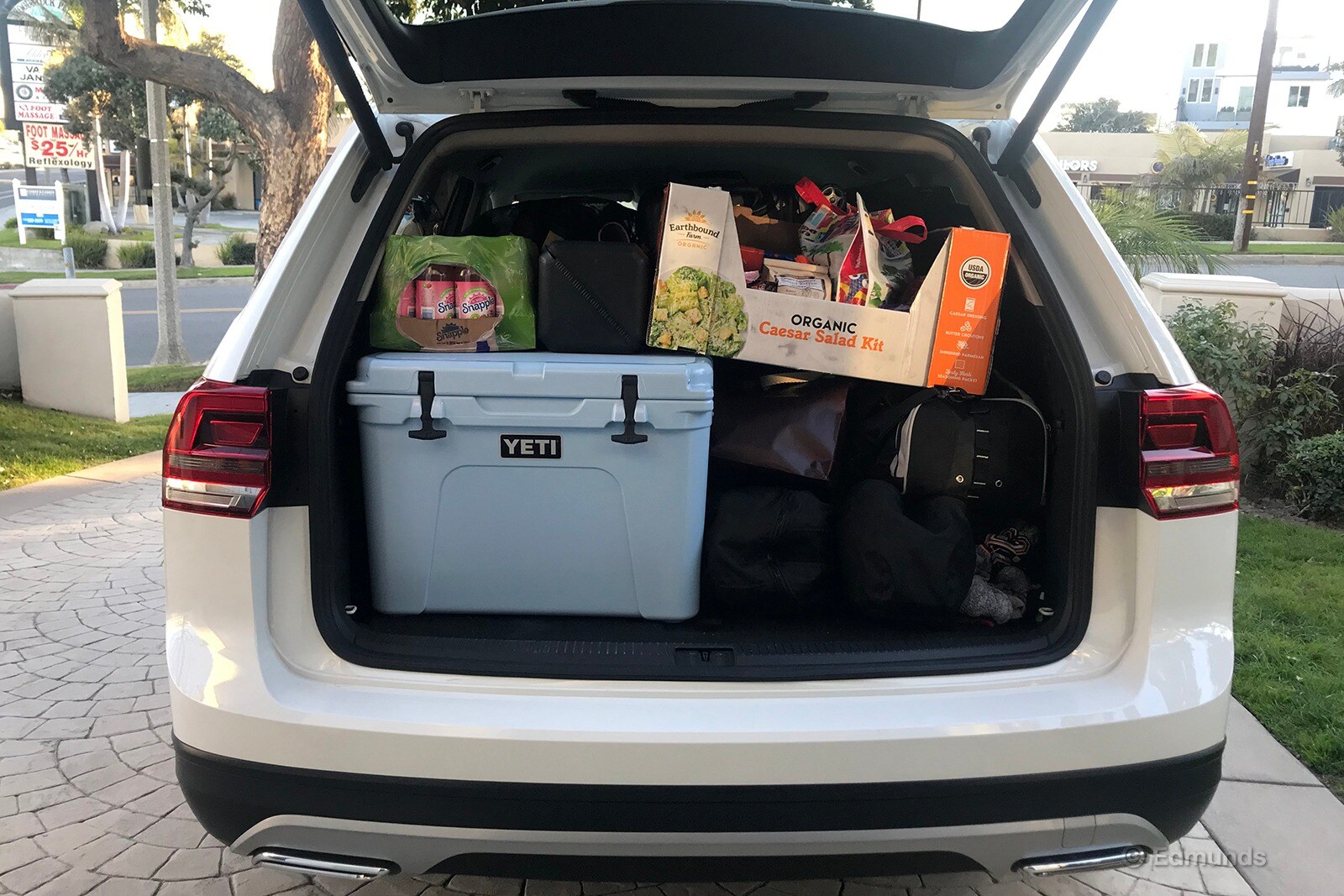
Monthly Update for January 2019
Where Did We Drive It?
We didn't take our 2018 Volkswagen Atlas SE on any record-breaking trips in January. Instead, we drove it around L.A. and used it as family transport. Even so, we did take it on a few highway runs to stretch its legs and keep up our respectable monthly fuel economy average.

What Kind of Fuel Economy Did It Get?
We added 1,870 miles to the Atlas' odometer in January. It was a relatively city-heavy month for the Atlas, but we were able to take a few day trips to bring the monthly average up to 17.4 mpg. Though it remains a few ticks shy of the EPA combined rating of 19 mpg, it's still pretty close, especially since the vast majority of the SUV's miles have come from low-speed city driving.
On a brighter note, it looks like we'll hit our yearly target of 20,000 miles with ease. It can sometimes be a struggle to break the 20K-mile mark, especially with cars we aren't particularly fond of (see our 2018 Mini Countryman S E Hybrid Wrap-Up). But the Atlas is popular with our staff. Not only is it tremendously practical, we don't really have any major complaints either. We like it so much that the Atlas is currently No. 3 on our list of top-rated midsize three-row SUVs.
Average lifetime mpg: 18.5
EPA mpg rating: 19 combined (17 city/23 highway)
Best fill mpg: 25.9
Best range: 397.6 miles
Current odometer: 13,301 miles
Maintenance and Upkeep
None.
Logbook Highlights
Interior
"I take road trips to Las Vegas a couple of times a year, typically traveling with five other people and their luggage. I generally try to get a large vehicle from our fleet, so we only have to take one car. Minivans are the best for this trip because they have enough third-row head- and legroom for adults, along with deep cargo wells with plenty of storage.
"Midsize SUVs, which can technically hold the same number of people, are a mixed bag. Some, like the Toyota Highlander, don't have back seats large enough for adults. (It's the reason my group split up in a trip we took a few years ago; I took three people in our Kia Cadenza instead.) Others, like the Honda Pilot, have room for adults and, surprisingly, their luggage as well.
"The Volkswagen Atlas' vast interior and sizable cargo area make it suitable for long-distance driving with a car full of people. It's definitely the SUV I'll take on the next Vegas trip." — Cameron Rogers, reviews editor
Miscellaneous
"I'm a big fan of the Atlas' muscular design. In some respects, it reminds me of the similarly designed-with-a-ruler, first-generation Cadillac SRX. Even though it's just as arrow-straight, the Atlas looks far better, without the SRX's weird overhangs and awkward proportions. The bold design and pronounced wheel arches give the Atlas a road presence that is distinctive from other three-row SUVs. It definitely appeals to people who need a midsize crossover but who are turned off by the segment's typically mundane sheet metal." — Cameron Rogers

Monthly Update for February 2019
Where Did We Drive It?
With many of our editors out of town on press events (or away from the office after an unexpected outbreak of jury duty), our long-term fleet didn't see much action in February.
Our 2018 Volkswagen Atlas was an exception; we drove it home 26 out of the month's 28 days. We didn't go on any epic road trips or ski vacations, but we still managed to rack up a respectable 1,470 miles during a relatively slow time of the year.
What Kind of Fuel Economy Did It Get?
Though our February average of 17.8 mpg beat January's 17.4 mpg, the Atlas' overall fuel economy continued its mild decline. It remained one of the most popular cars in our fleet, but we mostly used it for around-town driving, which contributed to the underwhelming fuel economy average. The overall average was down slightly, from 18.5 to 18.4 mpg.
Average lifetime mpg: 18.4
EPA mpg rating: 19 combined (17 city/23 highway)
Best fill mpg: 25.9
Best range: 397.6 miles
Current odometer: 14,770 miles
Maintenance and Upkeep
Since our last update, Volkswagen has released recall information for certain 2018-2019 Volkswagen Atlas, 2015 Volkswagen Golf SportWagen and 2019 Volkswagen Jetta models. Per the NHTSA website: "The rear axle coil springs in affected vehicles may not have met factory
specifications due to a defect in materials or because of problems in the spring
production process. These issues can impact the long-term durability of the
rear axle coil springs."
The NHTSA reports that up to 6,324 Volkswagen vehicles are affected, and Atlas models with this problem were built between May 14 and October 26, 2018. Since our Atlas was built in April 2018, it is not involved in this recall.
Owners can go to the NHTSA's recall website or Volkswagen's recall website to see if their vehicle is affected.
Logbook Highlights
Interior
"I like to keep things simple. Sometimes that comes off as boring, but I am OK with that. Apply this aspect of my persona to the interior of a car and you get, well, our Atlas.
"The white-on-black gauge cluster screams function, aside from a splash of red on the gauge needles and tachometer dial. The same is true for the A/C controls, the shift lever and all of the dashboard, apart from integrated touches of silver. I don't mind that it's stark. It's all business and operates as expected, and I like that.
"Last week I jumped in the car for a 45-minute drive to trade cars with a co-worker. Despite the distraction of rush-hour traffic and my own fatigue from a long day at the office, the VW made it easy. I settled right in, navigated to his house with the car as my guide and arrived without issue. I'd drive this car every day and be perfectly content. Not excited. But definitely content." — Mike Schmidt, senior manager, vehicle testing operations
Cargo Space
"In addition to the vast amount of passenger space, the Atlas offers the segment's largest cargo hold. With all seats in use, the Atlas has a useful 20.6 cubic feet, which is 2-5 more cubic feet than most rivals. Drop the second and third rows, and you've got a whopping 96.8 cubes to work with.
"For reference, the new Subaru Ascent offers 86 cubic feet, the Honda Pilot clocks in at 83.8 cubes, and the Toyota Highlander has 83.2 cubes. The Atlas is not quite minivan-big, but shoppers who want the maximum amount of storage room would do well to consider the Atlas." — Cameron Rogers, reviews editor
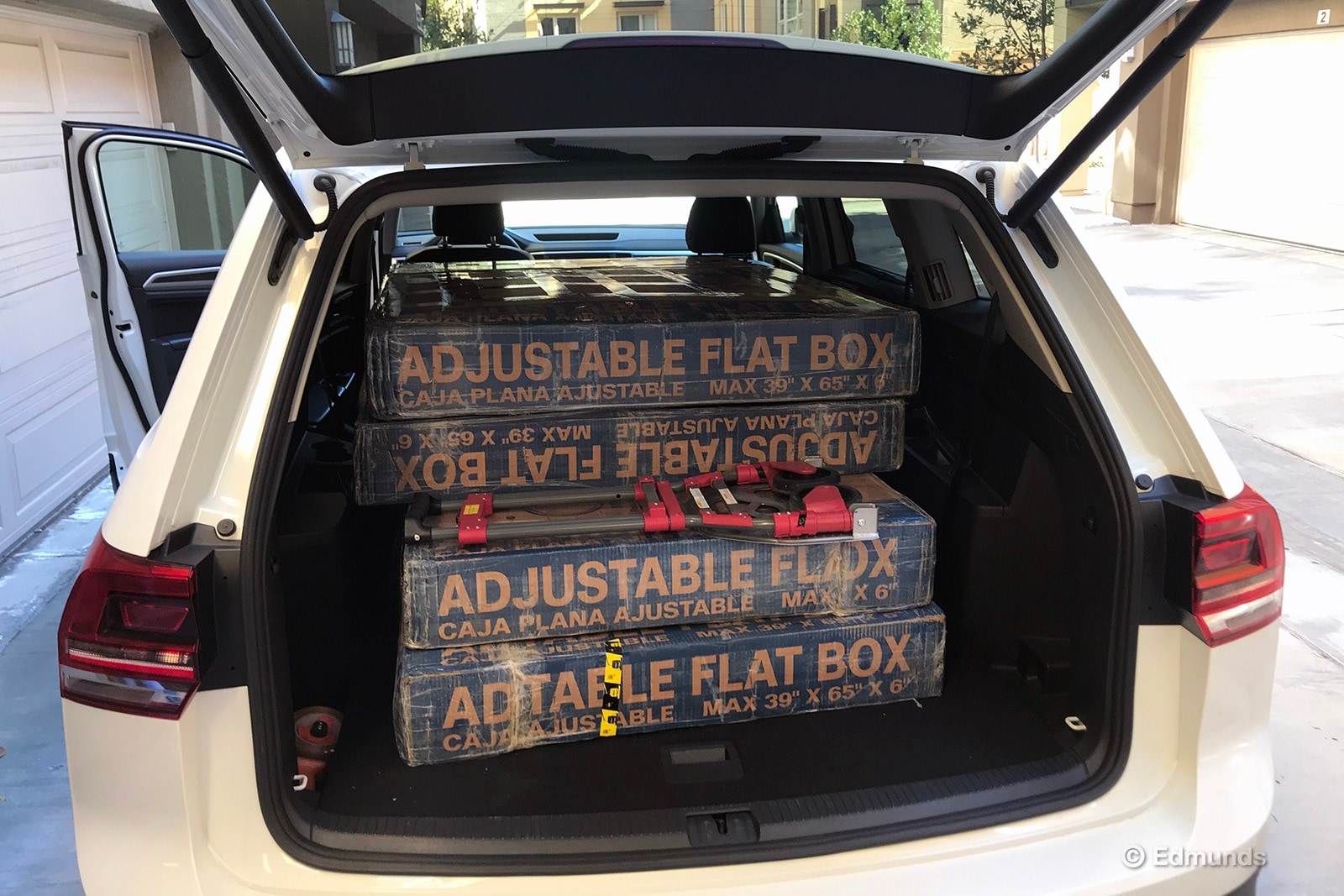
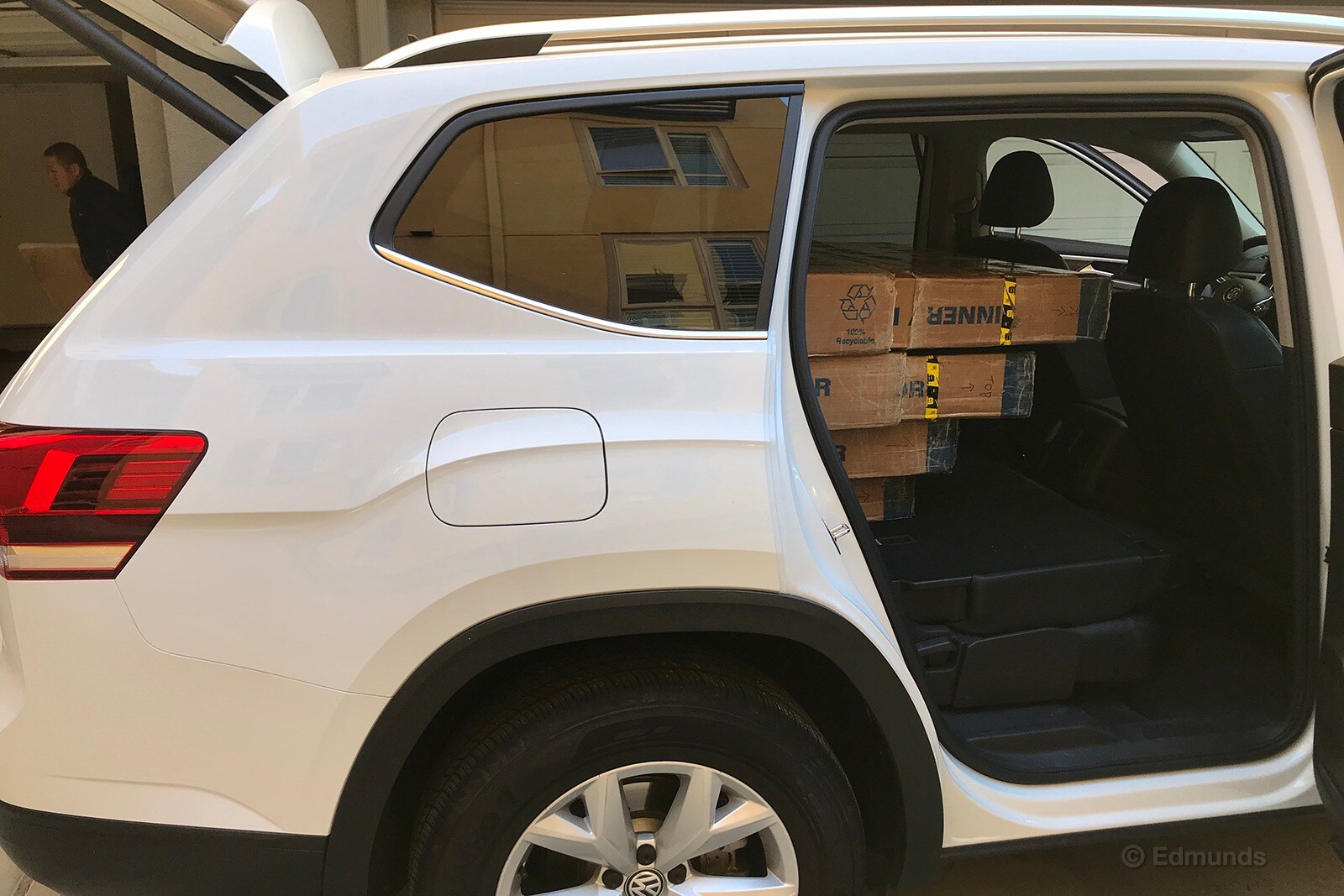
Monthly Update for March 2019
Where Did We Drive It?
Our 2018 Volkswagen Atlas spent the first half of March tooling around town and performing everyday tasks such as transporting kids and groceries. But our large-and-in-charge SUV had been on commuting duty for months, and one of our editors decided his upcoming road trip to Utah was the perfect opportunity to add some miles to the big brick.
Thanks to the long-distance drive, March is one of the better months for our Atlas in terms of fuel efficiency. And the VW is now on track to meet the 20,000-mile yearly target we set for all our long-term cars.
What Kind of Fuel Economy Did It Get?
Our Atlas fared poorly at the beginning of March — 373 miles of traffic-heavy city driving netted a low 12.8 mpg after two tanks of gas. Then Josh Sadlier stepped in to save what was shaping up to be the Atlas' worst month yet.
Josh is an avid golfer, and the links at Sand Hollow Resort outside St. George, Utah, were singing a sweet siren song he couldn't ignore. Knowing the Atlas had more passenger and cargo room than any other car in our fleet, he grabbed the keys, a friend and two sets of clubs.
His trip yielded three solid highway tanks' worth of data, two of which surpassed the Atlas' EPA highway score. (The other included a detour to the Las Vegas airport to pick up one more passenger and requisite luggage.)
The Atlas averaged 23.3 mpg over Josh's 1,000-mile trip, raising the monthly average to an even 19 mpg. Lifetime fuel economy increased, too, inching up from 18.4 to 18.5 mpg.
Average lifetime mpg: 18.5
EPA mpg rating: 19 combined (17 city/23 highway)
Best fill mpg: 25.9
Best range: 397.6 miles
Current odometer: 16,141 miles
Maintenance and Upkeep
None.
Logbook Highlights
Comfort
"It's a long way from L.A. to Hurricane, Utah — 420 miles, to put a number on it. As such, I was pleasantly surprised to have zero aches or pains when I got to Hurricane after a full day of driving. The driver's seat looks quite basic, but it's got firm support in all the right places. I also appreciated the quiet cabin and light, yet reasonably precise, steering. I generally prefer a more engaging driving experience. But in this case, the Atlas' 'set it and forget it' personality was perfect for the occasion." — Josh Sadlier, senior manager, content strategy

Performance
"I wasn't impressed with the maximum range of this machine on my drive to Utah. I'd think a big ol' SUV would have a fuel tank to match, but the Atlas doesn't. With its 18.6-gallon tank, this seven-passenger minibus falls 2.5 gallons short of my own two-passenger 1999 Mercedes SL roadster. That would be fine if, say, the Atlas utilized one of VW's remarkably fuel-efficient turbodiesel engines (see my comment below for a rant about that), but the gas-swilling 3.6-liter V6 in our test vehicle is a different story.
"Looking back at the numbers, my best recorded range between fill-ups was 364 miles — and looking back at our entire 16,000-mile test so far, we've never once crossed the 400-mile threshold on a single tank. Either VW needs to bring back the diesel magic for this rig, which ain't happening, or else a larger fuel tank should be installed, which probably also ain't happening." — Josh Sadlier
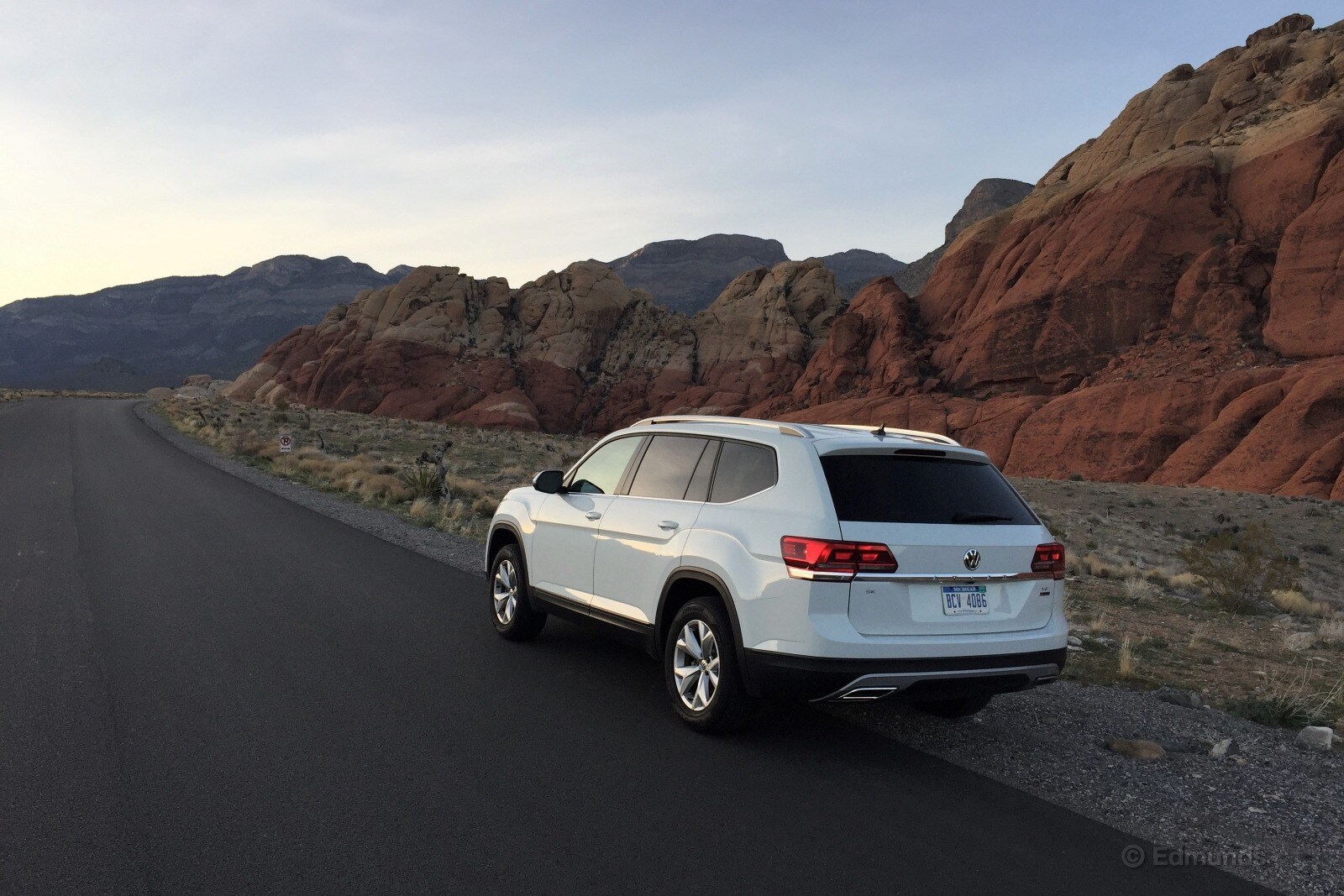
"Amid all the controversy around Volkswagen diesel engines over the past few years, it's been easy to lose sight of just how well those engines worked. From a vehicle evaluation standpoint, VW's TDI lineup was stunningly good. Performance-wise, every TDI engine provided great torque down low for effortless starts and hill climbs, while real-world fuel economy in our testing never failed to impress. I particularly enjoyed the TDI V6 found in the Touareg SUV, as it delivered luxury-grade refinement and thrust along with nearly 30 highway mpg and a theoretical range of 700 miles.
"Why am I blathering on about this? Because I really wish our Atlas had a TDI engine. Any of them would do; I'd even take the 2.0-liter four-cylinder TDI. The gas-powered 3.6-liter V6 in our Atlas just doesn't have the low-end torque that such a big rig demands, and we've only recorded two 25-mpg tanks since the Atlas arrived last summer.
"Swap in a TDI engine, and we'd have the trifecta of better torque, higher fuel economy and more range. But for the EPA cheating scandal that took the TDI family down, there'd surely be an Atlas TDI for sale here now, and it'd be the one to have." — Josh Sadlier
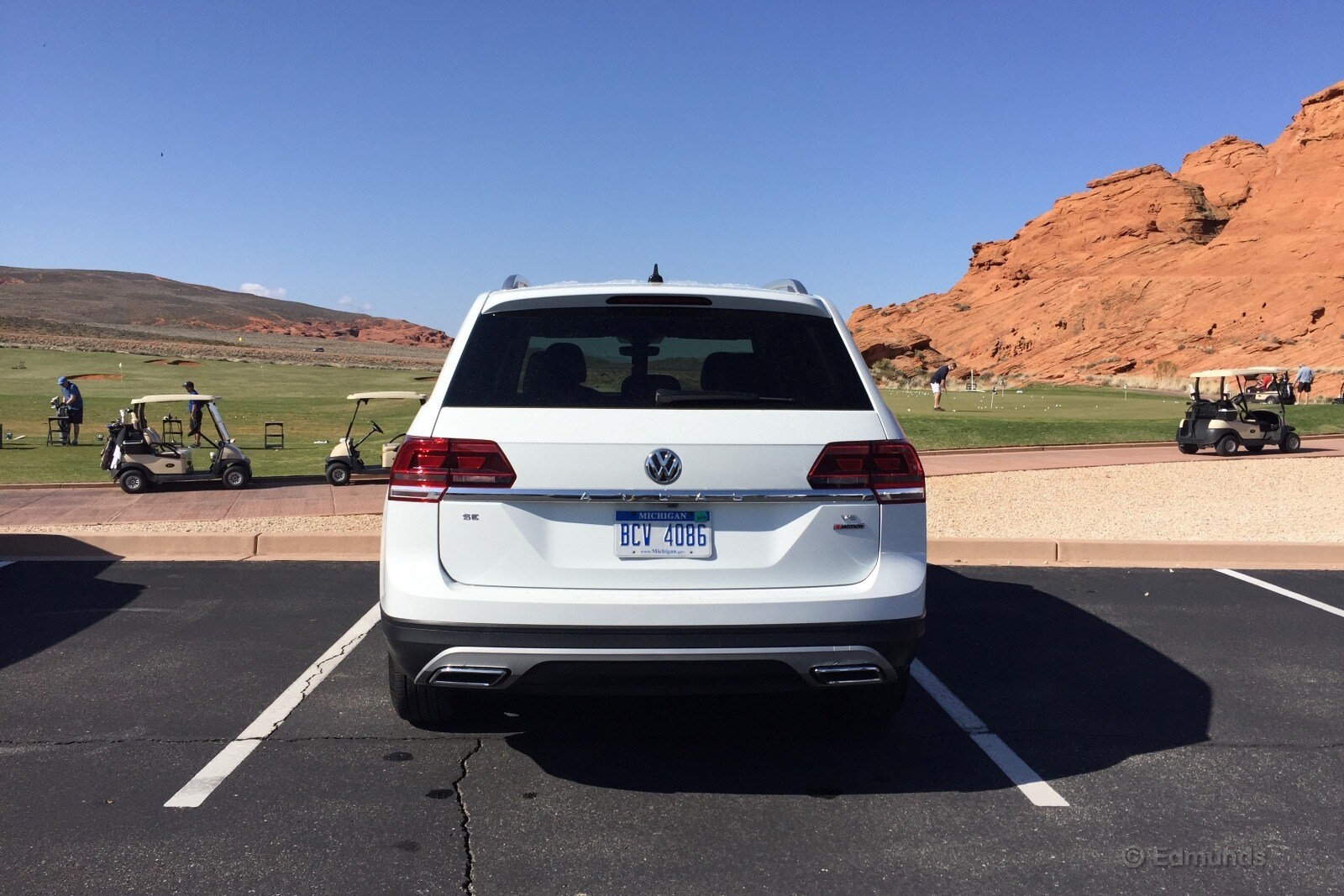
Monthly Update for April 2019
Where Did We Drive It?
It's no surprise that with its adult-friendly third row and large cargo area, the 2018 Volkswagen Atlas is one of the most practical vehicles in our fleet. Its everyday usability means the Atlas is signed out nearly every night, though it doesn't often stray far from home base. We added just 1,296 miles to its odometer in April, well below the 1,600 miles we shoot for every month. Even so, we're on track to hit our 20,000-mile goal by the time the Atlas goes back to Volkswagen in mid-June.
While the Atlas generally stayed close to our Santa Monica headquarters, I borrowed it for a weekend trip to a friend's wedding in Oak Glen, roughly 80 miles east of downtown Los Angeles. I needed room for five passengers and luggage and knew the Atlas was up to the task. It got the job done, transporting us in effortless comfort, with enough cargo room left over to also safely carry a few centerpieces and bottles of wine from the event. Read on to see how it fared for the rest of the month.
What Kind of Fuel Economy Did It Get?
My 280-mile round-trip excursion averaged 19.9 mpg, while a similarly lengthy stay with colleague Mike Schmidt yielded an average of 20.3 mpg. Combined with normal commuting duties, we traveled just less than 1,300 miles in April and consumed a little more than 74 gallons of 87-octane fuel, for a monthly average of 17.4 mpg.
This activity dropped our overall average slightly, from 18.5 mpg to 18.4 mpg.
Average lifetime mpg: 18.4
EPA mpg rating: 19 combined (17 city/23 highway)
Best fill mpg: 25.9
Best range: 397.6 miles
Current odometer: 17,443 miles
Maintenance and Upkeep
None.
Logbook Highlights
Performance
"I remain impressed with the Atlas' ride and handling. Considering how well-controlled body roll is, I'd expect a harsher ride. But the Atlas is quite compliant over bumps, and it rides far more smoothly than I'd expect for something that feels this stable in corners." — Will Kaufman, content strategist and news editor

Comfort
"Though its ergonomics are that of an SUV, it rides like a comfortable sedan. But the tires need to go. They're loud and transmit all manner of road noise into the cabin. I heard vibrations and drone from roads that are generally quiet even in sports cars." — Calvin Kim, vehicle test engineer
Interior
"I love the huge interior volume and comfortable seats. What would be amazing, though, would be a way to lower the third-row headrests from the front seats, à la Volvo. The headrests are tall and inhibit rear visibility." — Calvin Kim
Technology-Audio
"Man, our Atlas' stereo is a disappointment. It's flat and hollow, and the treble, mid and bass sliders aren't sufficient to coax balanced sound out of the speakers. If I were putting my money down, I'd either opt for the upgraded stereo in a higher trim level or pay a visit to my local car stereo shop." — Will Kaufman
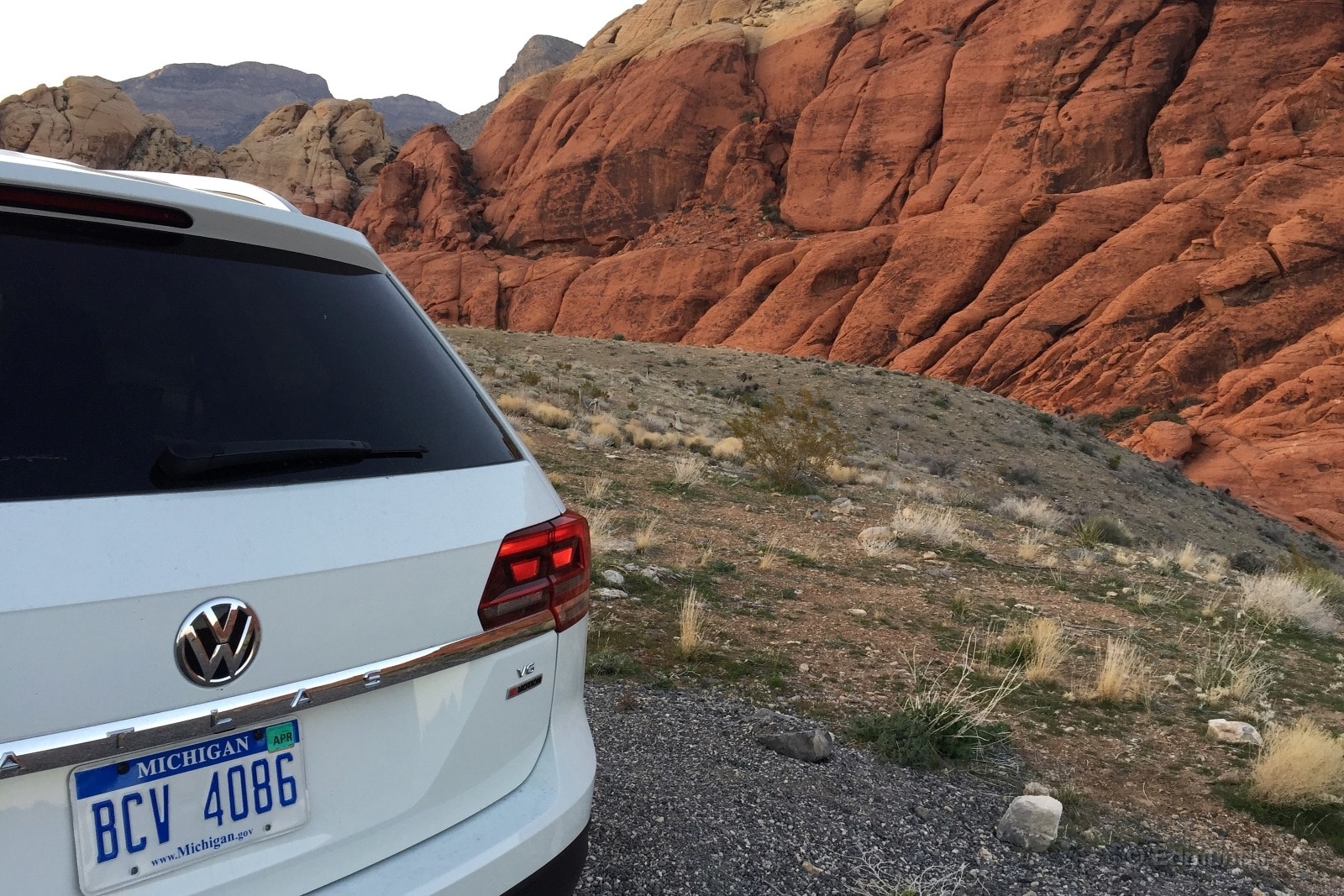
MPG
"I live 33 miles from work and leave the office at 5 p.m., the peak of Los Angeles gridlock. I basically live in bumper-to-bumper traffic. My morning commute is more of the same. At night, I run about 6 miles' worth of errands on a regular basis, consisting of trips to the gym and grocery store.
"When I got in the Atlas on Monday night, it had three-quarters of a tank of gas. In most crossovers, this could last me at least three days with my driving patterns. So color me shocked when I had to fill it up this morning after two round-trip commutes (132 miles) and about 12 additional miles of errands — 144 miles in total.
"Upon filling up, I noted the information we gather on fill-ups. On this tank, the Atlas traveled 198.3 miles while averaging 16.2 mpg (although the onboard computer reads 19.1 mpg). With gas prices spiking here, I feel sorry for anyone commuting in an Atlas. This thing is thirsty." — Rex Tokeshi-Torres, vehicle test technician
Monthly Update for May 2019
Where Did We Drive It?
As its tenure with us comes to a close, now seems like a good time to take stock of our soon-to-depart 2018 Volkswagen Atlas. In the past 11 months and nearly 20,000 miles, we've driven the Atlas all over Southern California, along with the occasional trip to Oregon or Utah. To put a finer point on it, our experts have spent enough time behind the driver's seat to provide a thorough analysis of its strengths and faults.
Our findings are below, but if you're more of a TL;DR type, know that our editors generally like everything about our SE with Technology tester, with the exception of its underpowered V6 engine. The Atlas feels lackadaisical even with just a driver on board, and it's downright lethargic when filled with passengers and luggage.
But there I go on an Atlas engine rant again. Read below for a tidy summary.
What Kind of Fuel Economy Did It Get?
With just a few weeks until our time with the Atlas ends, we're far past the point that any one good tank will have any impact on the overall fuel economy. Unless one of our editors decides to take it on a cross-country road trip solo, the Atlas will finish with an average of 18.5 mpg. Read below to learn how it stacks up against past long-term rivals.
Average lifetime mpg: 18.5
EPA mpg rating: 19 combined (17 city/23 highway)
Best fill mpg: 25.9
Best range: 397.6 miles
Current odometer: 18,695 miles
Maintenance and Upkeep
None.
Logbook Highlights
Performance
"The Atlas has an unpleasant way of accelerating away from a stop. It's too difficult to gauge the appropriate amount of gas pedal you need to move away smoothly, but with enough gusto that you keep pace with traffic. Get it too light and the Atlas feels sluggish as it short-shifts up to ever more fuel economy-conscious gears. Get it too heavy and your passengers groan as the Atlas pitches rearward under power. This engine seems strong, so why is the gas pedal so vague?" — Carlos Lago, manager, feature content
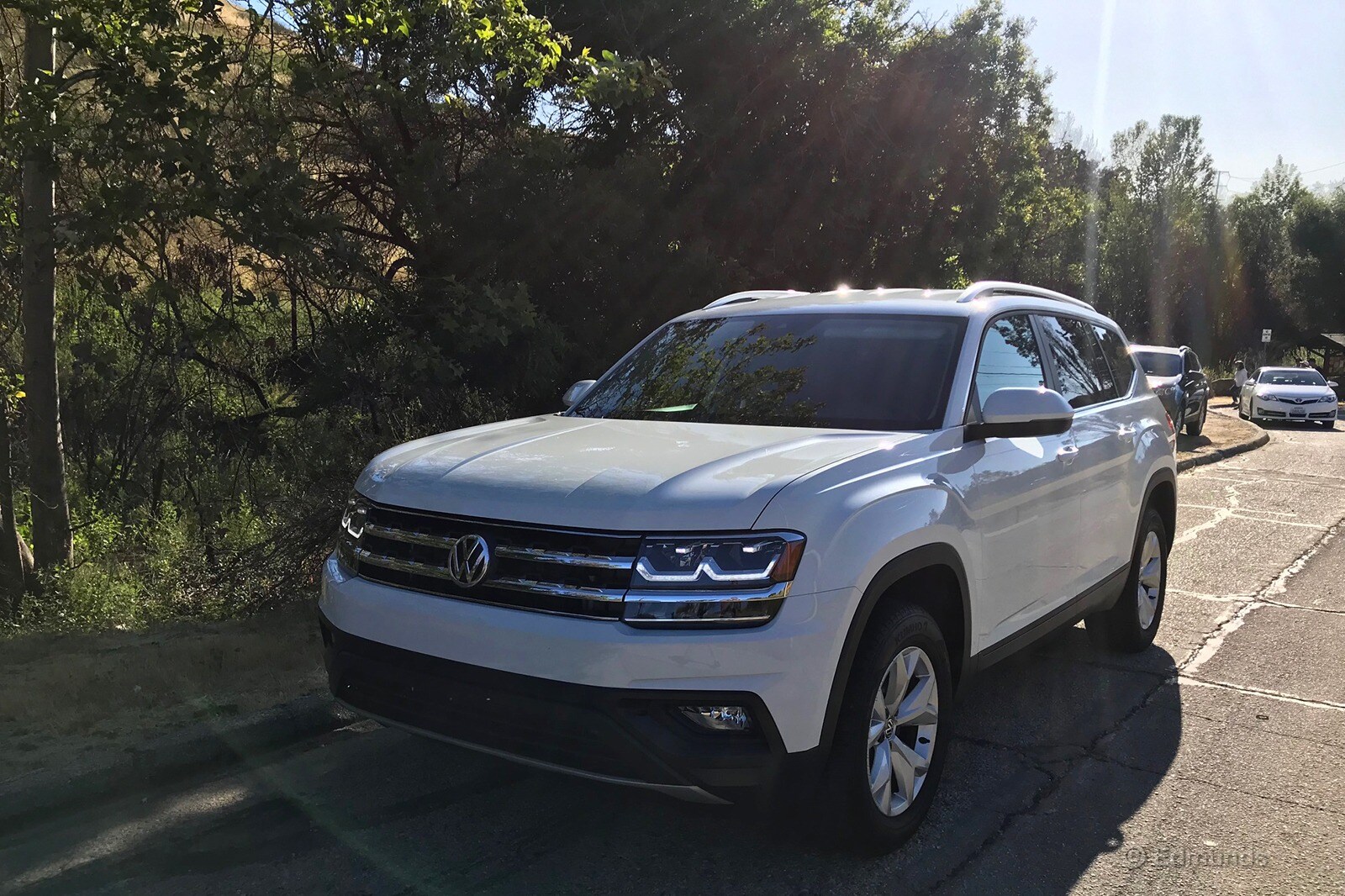
MPG
"How does the Atlas' overall fuel economy stack up against past long-term midsize three-row SUVs? I'm glad I asked!
"The 2013 Hyundai Santa Fe (called the Santa Fe XL for 2019) was the thirstiest, averaging 19.4 mpg, followed by the Toyota Highlander (19.8 mpg), Honda Pilot (20 mpg) and Mazda CX-9 (20.9 mpg). Notably, none of the other SUVs felt underpowered by their engines. With the Atlas, you get the worst of both worlds: tepid acceleration and middling fuel economy." — Cameron Rogers, reviews editor
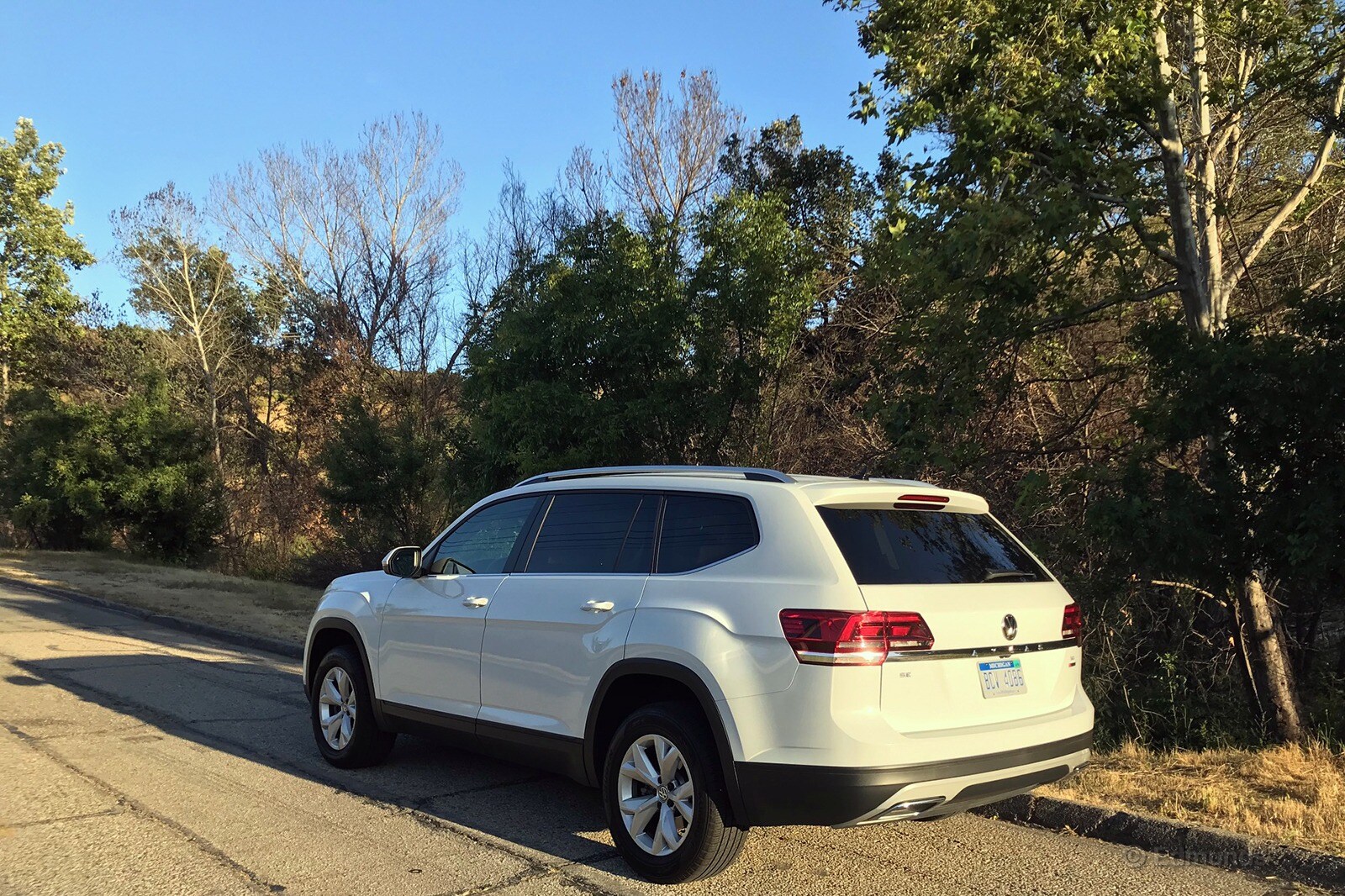
Miscellaneous
"Scour the comments throughout the last 11 months, and you'll find that most complaints focus on the Atlas' underpowered V6. That's not because the six-cylinder is egregiously bad, but because the Atlas has few other faults.
"Praises cover everything from the useful tech interface to its supple ride and relatively agile handling. Most impressive of all, however, is the amount of space it affords. Make no mistake, the Atlas is a big vehicle (though its body styling makes it appear larger and bulkier than it feels). But the third row is genuinely suitable for adults, and cargo space behind the third row is ample. If I was in the market for an adult-friendly three-row vehicle and just couldn't cope with a minivan, the Atlas would be my go-to pick." — Cameron Rogers
• • • • • • • • •
"Up until a few weeks ago, the Volkswagen Atlas was in the No. 3 slot in our rankings of midsize three-row SUVs. It was bumped to No. 4 once we got our hands on the new 2020 Kia Telluride.
"Though the Telluride's third row isn't as adult-friendly as the Atlas', the new Kia excels in other areas. The Telluride is only 0.5 second quicker to 60 mph than the Volkswagen, but the Kia's V6 doesn't feel strained, and executing passing maneuvers at highway speeds feels quicker, too. The Telluride's seats and ride are slightly more comfortable, and the cabin has fewer plastics in a top-trim comparison.
"Aside from checking all the requisite usability boxes, the Telluride's biggest differentiator is its value. It simply offers more features for the money, and even the top-trim SX is thousands less than rivals. The SX also adds two fairly rare features: a head-up display and ventilated second-row seats. To my knowledge, that makes the Telluride the least expensive vehicle on the market with ventilated second-row seats — a feature that is invaluable in our home base of Los Angeles, where we regularly reach triple-digit temperatures from late May until October.
"Normally this feature is only found on expensive luxury cars such as the Mercedes-Benz S-Class or BMW 7 Series sedans (it isn't even available on their range-topping SUVs). With the Telluride, you can get a luxurious crossover with ventilated second-row seats for under $50,000.
"The Telluride's exceptional comfort, roomy interior and excellent value recently earned it the top spot on our rankings of midsize three-row SUVs." — Cameron Rogers

Monthly Update for June 2019
Where Did We Drive It?
We aim to put 20,000 miles on every vehicle in our long-term fleet before it leaves. We usually make it, but every now and then we miss the target — a sports car might not go on many road trips, or we might lose interest in a capable but unremarkable sedan. Disinterest was certainly not the case with our 2018 Volkswagen Atlas. Its gigantic cabin and spacious cargo area have proven popular with families, and even drivers flying solo have chosen the Atlas for its cushy ride. We reached its mileage goal in June, 11 months after it entered our fleet.
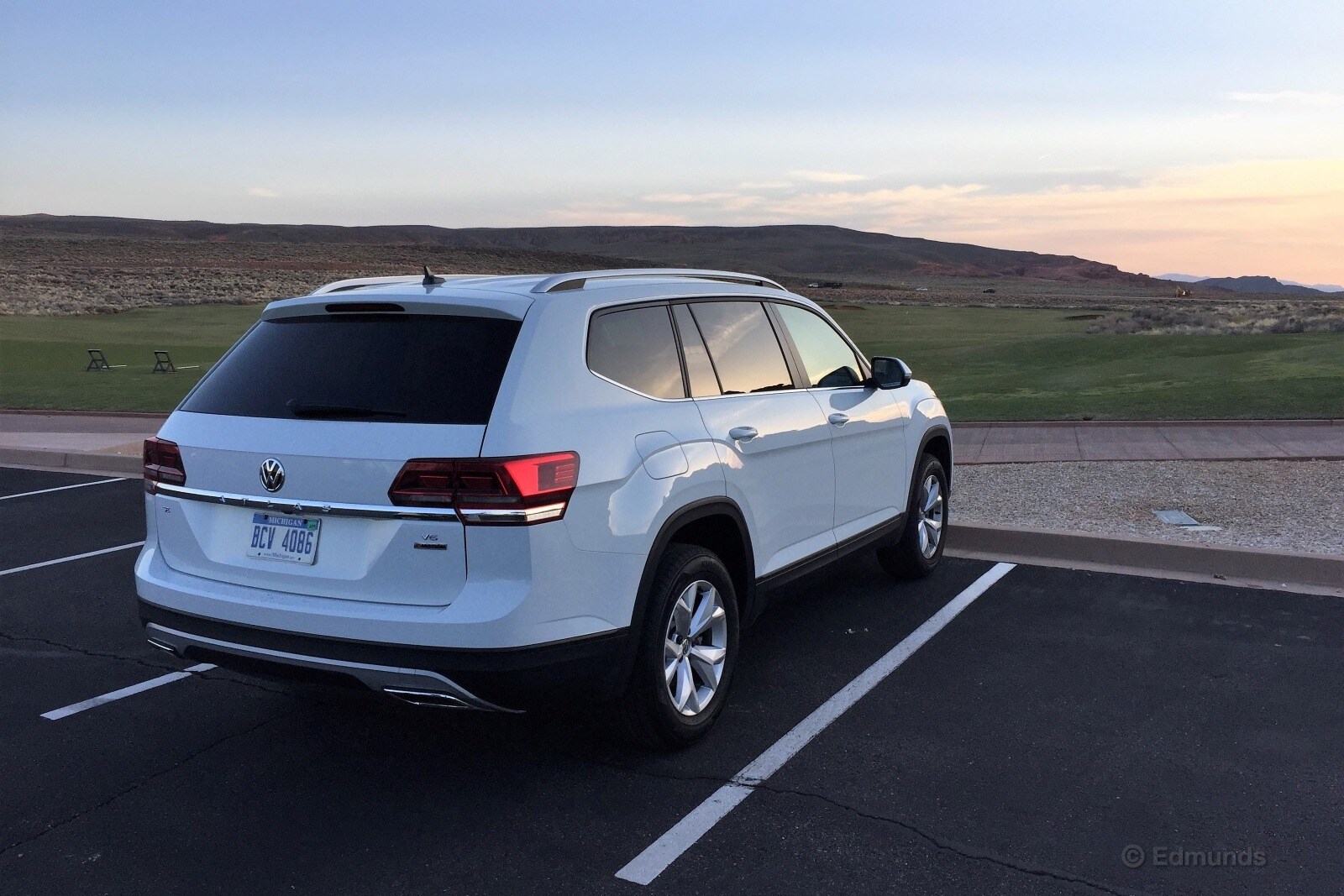
What Kind of Fuel Economy Did It Get?
Travis took the Atlas on a road trip to Sacramento this month, covering 1,000 miles over four days. Though a straight shot like this sometimes yields impressive fuel economy numbers, the Atlas was loaded with five passengers and their gear, and Travis ran into a few traffic jams along the way. His trip fuel economy worked out to 19.5 mpg, which is still better than the Atlas' overall. The rest of the month, the Atlas played shuttling duty around town, which ultimately lowered its overall fuel economy slightly, from 18.5 mpg to 18.4 mpg.
Average lifetime mpg: 18.4
EPA mpg rating: 19 combined (17 city/23 highway)
Best fill mpg: 25.9
Best range: 397.6 miles
Current odometer: 20,587 miles
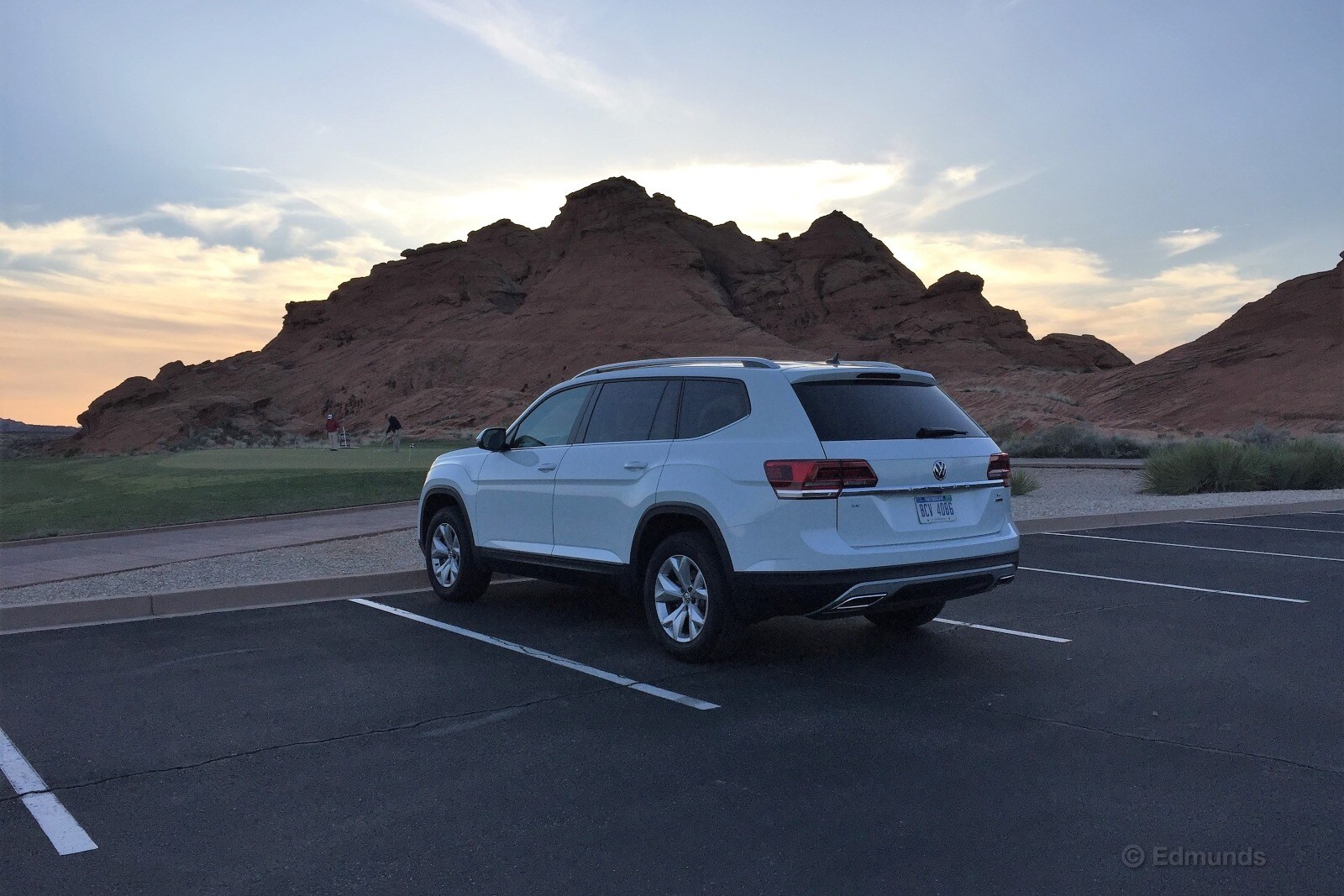
Maintenance and Upkeep
The Atlas passed 20,000 miles this month, which meant it was due for its second scheduled maintenance visit. The first, which we performed last December, called for only a brake inspection and oil change. That service set us back $97.44. The second service called for a more comprehensive set of checks and an oil change. Over the last month, we noticed the Atlas pulling slightly to one side, so we had the wheels balanced and rotated ($59). We also replaced the cabin air filter ($58.92). Our second service totaled $226.91.
Logbook Highlights
Performance
"There's frankly not enough low-end torque in this rig. The non-turbocharged V6 feels especially soft below 3,000 rpm and audibly struggles to get the Atlas' mass moving from a stop. I found myself revving it past 5,000 rpm at one point today just to keep up with city traffic. It's a mismatch between vehicle and engine, plain and simple. Mazda solved this problem in the rival CX-9 by tuning its turbocharged 2.5-liter four-cylinder engine to deliver big juicy torque down low. VW should follow suit and give the Atlas the punchy performance it deserves. As things stand, the pricier V6 might actually be a downgrade from VW's base 2.0-liter turbo-four in terms of drivability." — Josh Sadlier, director, content strategy
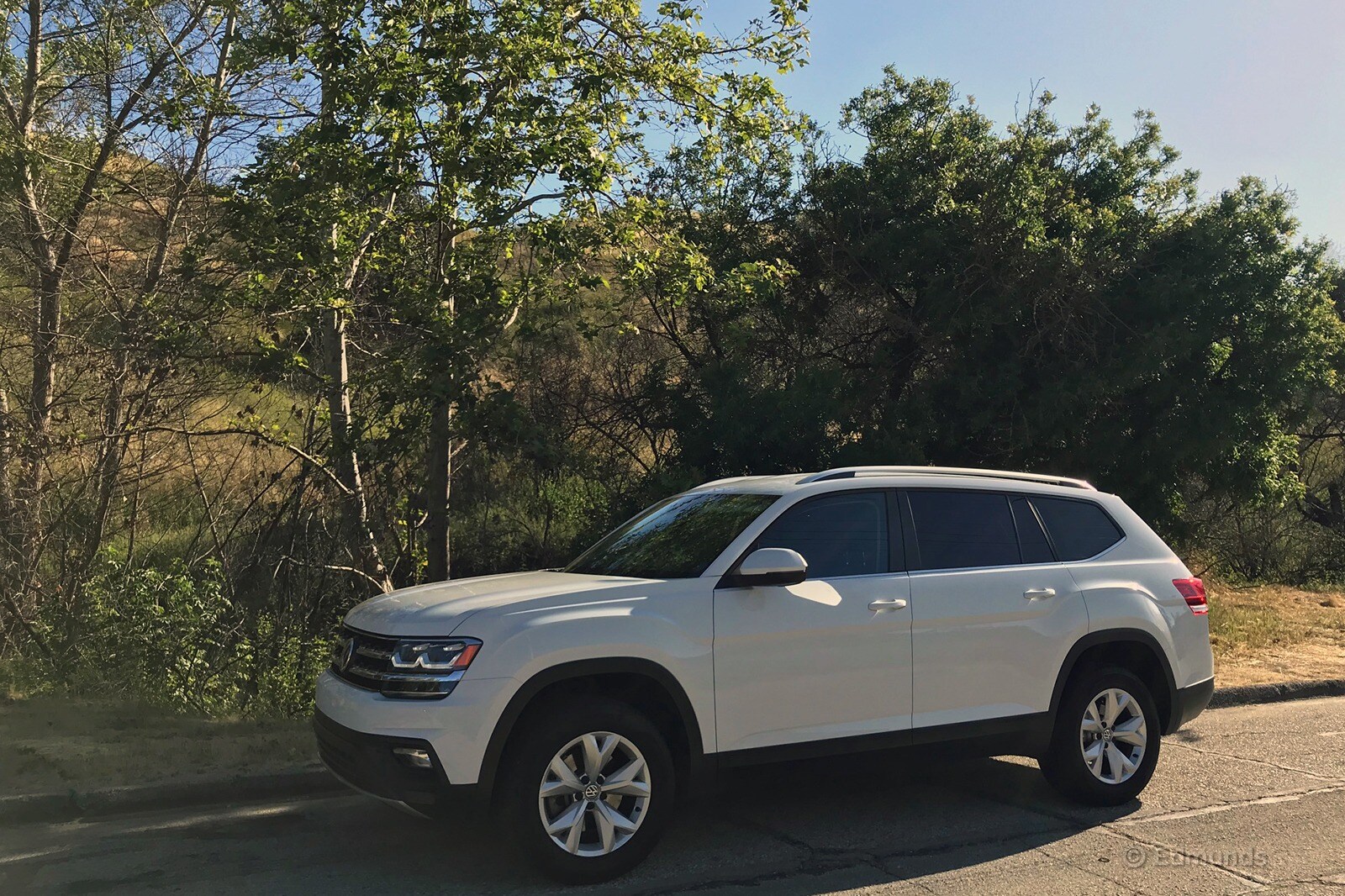
Comfort
"Driving the Atlas for 1,000 miles was just as comfortable and as easy as I'd hoped it would be. Sure, a few competitors — such as the Kia Telluride — feel more upscale, but the Atlas is solid. It feels secure but comfortable on the road, the powertrain is well-tuned and it doesn't feel massive until you try to navigate into a small parking space." — Travis Langness, reviews editor
Technology-Audio
"It hasn't evolved much over the last few years, but the Volkswagen infotainment interface still feels pretty upscale. I'd love to see an update for the fonts and maybe some of the build materials, but the resolution of the screen and speed of the commands are totally up to snuff. On a long road trip, it connected well to Apple CarPlay and easily managed a few devices being charged from multiple USB ports. With a big three-row SUV like this, I feel like I could use a bigger volume knob, but that's a very minor gripe." — Travis Langness
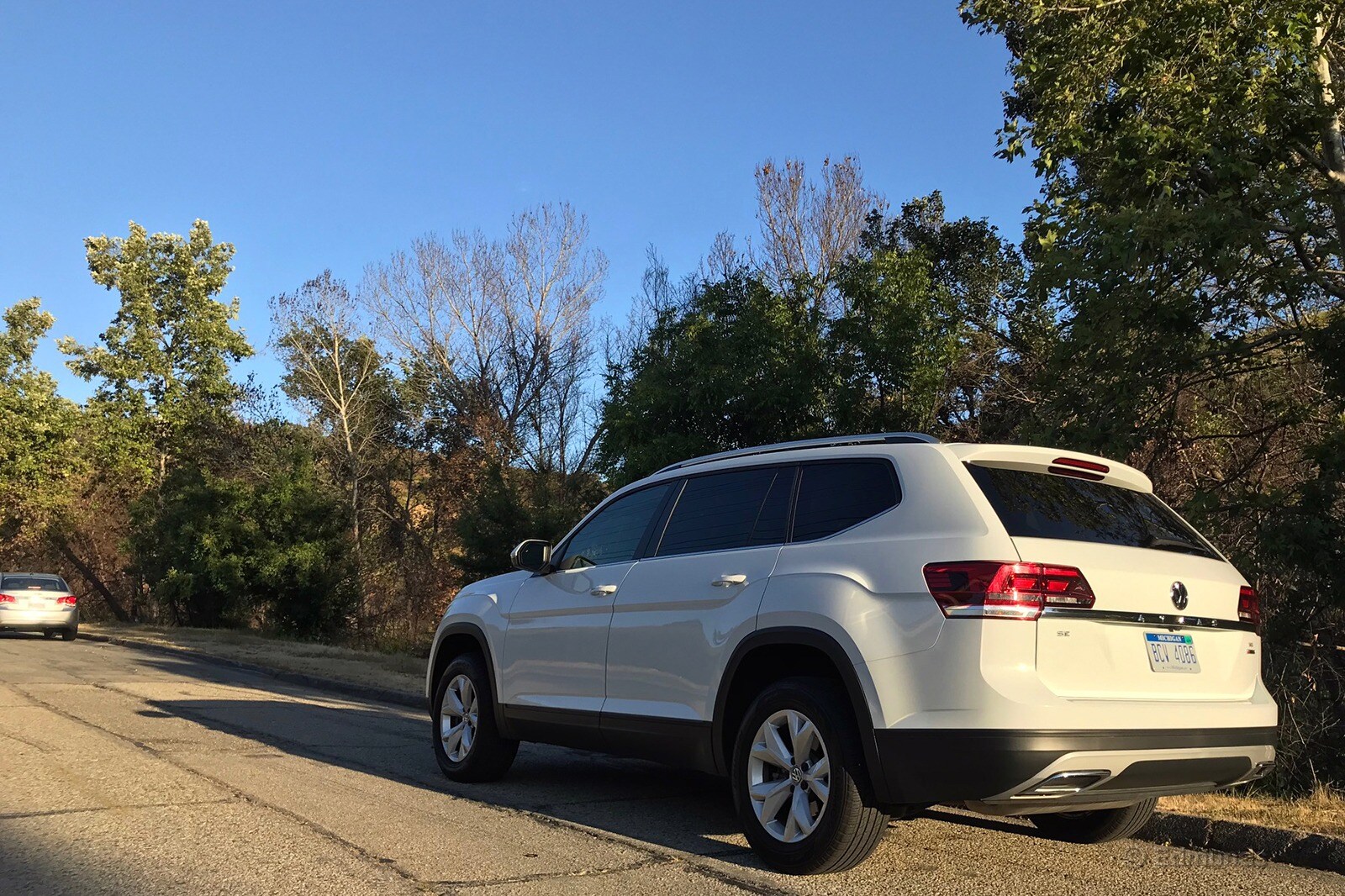
Wrap-Up
What We Got
When Volkswagen debuted the Atlas at the Los Angeles Auto Show in 2016, we were a little skeptical. Volkswagen's first new vehicle following the disastrous Dieselgate debacle was ... a giant three-row SUV?
Our opinions shifted once we got behind the wheel of the new crossover. The Atlas was larger than almost every other midsize three-row, which helped give it superior third-row passenger space and cargo room.
While its turbocharged four-cylinder engine looked sufficiently powerful on paper, we worried it wouldn't be enough for hauling seven passengers plus cargo. We went for the optional V6 instead for our long-term test and also selected the 4Motion all-wheel-drive system for added versatility.
The base S model came well-equipped, but we wanted to test a few more features while keeping the cost reasonable. In our review of the 2018 Volkswagen Atlas, we recommended the SE trim with Technology package, so that's exactly what we ordered. Our long-term Atlas stickered at $40,065, including the destination charge.
We wasted no time putting the Pure White Atlas through its paces, with Dan Edmunds and Brent Romans taking it on separate back-to-back road trips. They were the first of many, all of which are cataloged on the Atlas' long-term updates page. Read on for a condensed version of our impressions and opinions over the last 12 months and 23,000 miles.
Performance
"There's frankly not enough low-end torque in this rig. The non-turbocharged V6 feels especially soft below 3,000 rpm and audibly struggles to get the Atlas' mass moving from a stop. I found myself revving it past 5,000 rpm at one point today just to keep up with city traffic. It's a mismatch between vehicle and engine, plain and simple. Mazda solved this problem in the rival CX-9 by tuning its turbocharged 2.5-liter four-cylinder engine to deliver big, juicy torque down low. As things stand, the pricier V6 might actually be a downgrade from VW's base 2.0-liter turbo-four in terms of drivability." — Josh Sadlier, director, content strategy
"I like this engine, but why is it in the Atlas? The non-turbocharged VR6 is the one distinctly Volkswagen element in the Atlas and the only part of the Atlas with any personality. It's responsive and revs pretty freely, returning a nice, natural power curve. But it's lost in the big SUV's engine bay, weighed down and made sluggish by an excess of steel to cart around. There's a reason turbocharged motors are the default for the current generation of big SUVs. And it's not just for fuel economy, it's also the immediate low-end torque." — Will Kaufman, content strategist and news editor
"One thing the Atlas will never be praised for is feeling small and nimble. Yeah, I know, these big three-row crossovers are, well, big. But I find the Atlas particularly bus-like from behind the wheel. Some larger vehicles have the desirable trait of seeming to shrink a size or two at speed. Sorry, Atlas. Not you." — Josh Sadlier
"I remain impressed with the Atlas' ride and handling. Considering how well-controlled body roll is, I'd expect a harsher ride. But the Atlas is quite compliant over bumps, and it rides far more smoothly than I'd expect for something that feels this stable in corners." — Will Kaufman
"My family and I took the Atlas to Oregon to visit my parents, and I went into the drive with no expectations of our new three-row SUV. I couldn't have been more pleasantly surprised. Its steering turned out to be just about perfect, with impeccable straight-line stability on the long freeway stretches, smooth response, and nicely weighted effort buildup through the mountainous turns farther up the road. The chassis swallowed up the coastal Northwest's wavy pavement with no apparent effort, and the Atlas felt at home carving through any number of corners, whether they were billiard-table smooth or tortured by land movement. Where did this come from?" — Dan Edmunds, director, vehicle testing
MPG
"Our round trip [from Southern California to Oregon] amounted to 2,129 miles. The Atlas averaged 23.7 mpg overall, which compares quite favorably to its fuel economy rating of 19 mpg combined (17 city/23 highway). The trip was a mix of highway cruising, some city driving and even a bit of light off-roading. All of that makes the fact that the average exceeded the highway rating impressive enough, but the trip's best tank of 25.9 mpg (over a best-range distance of 397.6 miles) pretty much destroyed the highway rating. If this trip is any indication, Atlas mpg ratings are pretty achievable." — Dan Edmunds
"I live 33 miles from work and leave the office at 5 p.m., the peak of Los Angeles gridlock. I basically live in bumper-to-bumper traffic. My morning commute is more of the same. At night, I run about 6 miles' worth of errands on a regular basis, consisting of trips to the gym and grocery store.
"When I got in the Atlas on Monday night, it had three-quarters of a tank of gas. In most crossovers, this could last me at least three days with my driving patterns. So color me shocked when I had to fill it up this morning after two round-trip commutes (132 miles) and about 12 additional miles of errands — 144 miles in total.
"Upon filling up, I noted the information we gather on fill-ups. On this tank, the Atlas traveled 198.3 miles while averaging 16.2 mpg (although the onboard computer reads 19.1 mpg). With gas prices spiking here, I feel sorry for anyone commuting in an Atlas. This thing is thirsty." — Rex Tokeshi-Torres, vehicle test technician
"I wasn't impressed with the maximum range of this machine on my drive to Utah. I'd think a big ol' SUV would have a fuel tank to match, but the Atlas doesn't. With its 18.6-gallon tank, this seven-passenger minibus falls 2.5 gallons short of my own two-passenger 1999 Mercedes SL roadster.
"Looking back at the numbers, my best recorded range between fill-ups was 364 miles. And looking back at our entire 16,000-mile test so far, we've never once crossed the 400-mile threshold on a single tank. Either VW needs to bring back the diesel magic for this rig, which ain't happening, or else a larger fuel tank should be installed, which probably also ain't happening." —Josh Sadlier
Comfort
"Our Atlas is impressively comfortable for long-distance driving. I like the way VW tuned the suspension. It absorbs bumps with ease and does so without being soft or wallowy. I'm also comfortable in the driver's seat. I've done a few five-hour stints in the Atlas and felt just fine. Using the Atlas for an all-day drive should be easy." — Brent Romans, senior editor, written content
"Driving the Atlas for 1,000 miles was just as comfortable and as easy as I'd hoped it would be. Sure, a few competitors — such as the Kia Telluride — feel more upscale, but the Atlas is solid. It feels secure but comfortable on the road, the powertrain is well-tuned and it doesn't feel massive until you try to maneuver into a small parking space." — Travis Langness, reviews editor
"Though its ergonomics are that of an SUV, it rides like a comfortable sedan. But the tires need to go. They're loud and transmit all manner of road noise into the cabin. I heard vibrations and drone from roads that are generally quiet even in sports cars." — Calvin Kim, vehicle test engineer
Cargo Space
"Last weekend we loaded the Atlas for a two-night beach camping trip. We packed light. Regardless, with the third row down, we had space for a cooler, tent, chairs, sleeping bags, and more. And there was room to spare. I'd consider it equally as good in the cargo department as the three-row [pre-2020] Explorer we left parked in the garage." — Mike Schmidt, senior manager, vehicle testing operations
"I wheeled the Atlas from L.A. to Ventura County for a golf weekend with two friends, and it was the perfect tool for the job. With the third row folded flat, it was like having a truck bed back there. We could throw our golf bags in lengthwise, add a couple of pull carts and various other items, and not even fill up the cargo bay halfway. These three-row behemoths are often judged on the third row itself. But when that row isn't in use, the massive cargo space can be just as handy." — Josh Sadlier
"You know those people who carry humongous 40-ounce water bottles? I'm one of those, and I'm always on the lookout for cupholders that can accommodate my oil drum-size bottles. Usually, I have to place my water bottle between the door and my thigh or on the passenger seat, so it is easily accessible. Thankfully, I can report that our Volkswagen Atlas can store my water bottle safely. Hydration is important, especially in the brutal heat of a Southern California summer." — Rex Tokeshi-Torres
Interior
"I am impressed by the Atlas as a kid-hauler.
"Access: The rear door opening is exceptionally wide, and the door itself swings open 90 degrees. It makes the door heavy for kids to open, especially in the tight quarters of parking lots. But I do appreciate how easy it is to maneuver my heavyweight front-facing toddler seat into the car.
"Installation: The car seat anchors are easily accessed, as is the seatback-mounted top tether. A well-placed seat-folding lever beside the headrest means I don't have to climb into the cargo area to clip or tighten the upper tether either. I don't have to remove the headrests because they lift high enough to clear the top of the child seat.
"Seat pros: The seatbacks recline and the lower cushions slide fore and aft. The double-wide Atlas seat bottoms allow for the entire child seat base to fit, unlike some cars where they hang over into the next seat. This allows me to recline the seats to an optimal safe-yet-sleep-ready position.
"Seat cons: Going back to the sliding second-row seats — they don't slide very far. There is enough space that tikes headed for the third row can probably wriggle past. Anyone larger requires Cirque du Soleil levels of flexibility, involving scaling the second row, climbing through the cargo area or removing and reinstalling the child seats. At the very least, all options qualify as annoying.
"Still, the pros far outweigh the cons when it comes to the kid-friendly Atlas. It is shaping up to be one of my favorites in this segment." — Mike Schmidt
"This VW feels big inside. The cabin is wide, but it doesn't feel like the front-seat passenger is far away. What there is instead is an abundance of elbow and hiproom. You aren't even close to being scrunched up against the door panel.
"As for the seats, they offer plenty of space and good support. I only wish the seat bottom was less flat and more conforming. It's not a perfect fit for my tall frame.
"At first I thought the dashboard styling was a bit dull, but my wife was a big fan. She liked the clean lines and simplicity. There's a lot to be said for that, but it still seems like the switchgear and buttons are dwarfed by the size and scale of the Atlas' cabin." — Dan Edmunds
"Not all cars are perfect, and for me, the Atlas' weak spot is its interior design. The dashboard is drab and plain. Some would call it 'understated' or 'minimalist,' but I think it's downright ugly. There's a ton of plastic everywhere, and none of it looks or feels substantial or expensive. It's not anything that would prevent me from buying the Atlas — its other strengths outweigh this drawback — but the Atlas doesn't look like it earns its price tag. The fact that you can only get real leather on the top trim, nearly $50,000 SEL Premium (most others come with faux leather), is outrageous." — Cameron Rogers, reviews editor
Audio and Technology
"It hasn't evolved much over the last few years, but the Volkswagen infotainment interface still feels pretty upscale. I'd love to see an update for the fonts and maybe some of the build materials, but the resolution of the screen and speed of the commands are totally up to snuff. On a long road trip, it connected well to Apple CarPlay and easily managed a few devices being charged from multiple USB ports. With a big three-row SUV like this, I feel like I could use a bigger volume knob, but that's a very minor gripe." — Travis Langness
"The Atlas has one of the finest tech interfaces in the industry. It's easy to navigate and quick to respond to user inputs. Like the Atlas itself, the menus aren't extraordinarily attractive, but they are highly functional. Most of the virtual buttons disappear as you move your hand away from the touchscreen, reducing visual clutter when you aren't actively using it. And as Kathleen pointed out last month, the ability to preview songs before actually selecting a radio station is exceptionally helpful. Just turn the dial until you find a song you like, then click the dial to enter. It's such a simple idea, and yet only a handful of user interfaces offer such a feature." — Cameron Rogers
"Man, our Atlas' stereo is a disappointment. It's flat and hollow, and the treble, mid and bass sliders aren't sufficient to coax balanced sound out of the speakers. If I were putting my money down, I'd either opt for the upgraded stereo in a higher trim level or pay a visit to my local car stereo shop." — Will Kaufman
"The lane keeping assist feature kicked in on a freeway on-ramp and it startled me. I don't always drive the latest and greatest cars in our fleet, so I'm not yet used to this relatively new kind of driving aid. I corrected my line quickly, intent on never wanting to feel the computer pulling on the wheel again." — Kathleen Clonts, copy chief
Maintenance
"This morning I dropped the Atlas off at Santa Monica Volkswagen for its 10,000-mile service. I didn't have an appointment. Still, I figured I'd be OK by arriving at 7 a.m. when the service center opened.
"My adviser reassured me that was the case, giving an estimated completion time of noon. But I heard nothing back from him by the time noon rolled around. At 2:00 p.m., I called and left a voicemail. He finally returned my call at 3:30, with no acknowledgment of the disparity between the expectation he set more than eight hours earlier and reality. It was certainly frustrating. It was also ironic since he started a conversation at drop-off about how inconsiderate some customers can be toward him. Regardless, the car was ready for pickup." — Mike Schmidt
Miscellaneous
"Around town and on the highway, the Atlas feels respectably maneuverable. Drive it around in a tight parking lot, however, and its bulky size becomes more apparent. This VW is one of the biggest crossovers on the market, dimensionally. Thankfully, it's pretty easy to see out of." — Brent Romans
"The Atlas is aesthetically pleasing, with a unique, broad design that stands out among other full- and midsize SUVs." —Rex Tokeshi-Torres
"My cousin told me he was considering either the Honda Pilot or the Volkswagen Atlas for his next vehicle purchase. He asked me what I thought was the better of the two SUVs. I told him they're both solid. But if he was going to buy, I'd go with the Pilot for the better resale value and proven reliability. If he was going to lease it, I'd recommend the Atlas since it's a change of pace from the Hondas he's driven in the past." — Ron Montoya, senior consumer advice editor
"Look, I 'get' the Atlas. The packaging is great and the interior is a positively massive space. You can carry adults comfortably in the third row and still have decent cargo area left over. It's relatively comfortable and rides well. But Lordy, the only thing in this vehicle with character is the VR6, and that's a problem because it's the wrong engine for a big SUV. Otherwise, the Atlas is painfully generic. Literally everything else in the segment has some sort of personality, whether that's great (Mazda CX-9) or not great (Chevy Traverse). The Atlas is just ... there. It's the automotive version of stain-proof chinos." — Will Kaufman
"Up until a few weeks ago, the Volkswagen Atlas was in the No. 3 slot in our rankings of midsize three-row SUVs. It was bumped to No. 4 once we got our hands on the new 2020 Kia Telluride.
"Though the Telluride's third row isn't as adult-friendly as the Atlas', the new Kia excels in other areas. The Telluride is only 0.5 second quicker to 60 mph than the Volkswagen. But the Kia's V6 doesn't feel strained, and executing passing maneuvers at highway speeds feels quicker, too. The Telluride's seats and ride are slightly more comfortable, and the cabin has fewer plastics in a top-trim comparison.
"Aside from checking all the requisite usability boxes, the Telluride's biggest differentiator is its value. It simply offers more features for the money, and even the top-trim SX is thousands less than rivals. The SX also adds two fairly rare features: a head-up display and ventilated second-row seats. To my knowledge, that makes the Telluride the least expensive vehicle on the market with ventilated second-row seats — a feature that is invaluable in our home base of Los Angeles, where we regularly reach triple-digit temperatures from late May until October.
"Normally this feature is only found on expensive luxury cars such as the Mercedes-Benz S-Class or BMW 7 Series sedans. With the Telluride, you can get a luxurious crossover with ventilated second-row seats for under $50,000.
"The Telluride's exceptional comfort, roomy interior and excellent value recently earned it the top spot on our rankings of midsize three-row SUVs." — Cameron Rogers
Maintenance & Repairs
Regular Maintenance:
Regular service is scheduled in 10,000-mile intervals. The first service call was for an oil change, tire rotation and fluid top-off. Pursuant to several recalls, the dealer also checked the brake caliper bracket bolts and second-row belt buckles, and it performed an engine control module (ECM) update. The entire service took eight hours and set us back $97.44.
We brought the Atlas back to VW Santa Monica for its second service, which consisted of an oil change and a more comprehensive set of checks. Before we took it in, we noticed the Atlas pulling slightly to one side, so we requested the wheels be balanced in addition to its scheduled rotation, which added $59 to the total. Since we frequently took it on long road trips — sometimes through quite dusty habitats — we thought it a good idea to also replace the cabin air filter, which added $58.92 to the bottom line. The second service totaled $226.91.
Service Campaigns:
While there were a considerable number of service bulletins and recalls for the 2018 Volkswagen Atlas, our model only required the aforementioned checks on the brake caliper bracket bolts and rear seat belts (which could be damaged if a car seat larger than recommended is installed in the center position). Other recalls that did not affect our vehicle included an improperly installed HVAC tube and a warning chime that might not sound if a key is left in the ignition.
Fuel Economy and Resale Value
Observed Fuel Economy:
Our V6 4Motion model is the thirstiest Atlas available, with an EPA rating of 19 mpg combined (17 city/23 highway). We achieved these results in real-world driving and averaged 18.9 mpg over 23,000 miles of city and highway driving. That said, our long-term all-wheel-drive Pilot earned 20 mpg overall, and our AWD Mazda CX-9 did even better at 20.9 mpg.
Our best result came early in the Atlas' tenure, during Dan Edmunds' round-trip adventure to Oregon. He set a record of 25.9 mpg that was never beaten, though Mike Schmidt came close on a road trip of his own that yielded 25.4 mpg.
Resale and Depreciation:
Our 2018 Volkswagen Atlas SE 4Motion with Technology package (phew!) carried an MSRP of $40,065, including destination. Over the course of a year, we added 23,442 miles to our odometer. In this condition, the Edmunds TMV Calculator valued the Atlas at $28,382 based on a private-party sale.
That works out to 29.2% depreciation, which is a nearly identical rate to our previous long-term 2016 Mazda CX-9. Both fared worse than our 2016 Honda Pilot Elite, which depreciated just 17% after one year and 25,000 miles.
Summing Up
Pros:
The exceptionally spacious cabin gives the Atlas more passenger and cargo room than its rivals. A comfortable ride and seats make long road trips pleasant. One of the most user-friendly touchscreen systems available.
Cons:
The engine is underpowered for the amount of weight it has to pull. A small gas tank and unimpressive fuel economy make for short distances between fill-ups. Interior materials are a little basic for the price.
Bottom Line:
While it has a few drawbacks, the 2018 Volkswagen Atlas is one of the best choices in the midsize three-row SUV segment. It's possibly the closest substitute for buyers who want minivan utility without minivan styling.
| Total Body Repair Costs: | None |
| Total Routine Maintenance Costs: | $324.35 (over 12 months) |
| Additional Maintenance Costs: | None |
| Warranty Repairs: | None |
| Non-Warranty Repairs: | None |
| Scheduled Dealer Visits: | 2 |
| Unscheduled Dealer Visits: | None |
| Days Out of Service: | None |
| Breakdowns Stranding Driver: | None |
| Best Fuel Economy: | 25.9 mpg |
| Worst Fuel Economy: | 11.1 mpg |
| Average Fuel Economy: | 18.9 mpg |
| Best Range: | 397.6 miles |
| True Market Value at Service End: | $28,382 (private-party sale) |
| Depreciation: | $11,683 (29.2% of original MSRP) |
| Final Odometer Reading: | 23,442 miles |
The manufacturer provided Edmunds this vehicle for the purposes of evaluation.